The new features in Blackboard’s December upgrade will be available from the morning of Friday 2nd December, with the exception of the drag-and-drop and course links improvements, which should be available by Monday 5th December. The December upgrade includes the following new features to Ultra courses, some of which were specifically requested by staff in our ‘What new features do you want to see in your Ultra courses?‘ survey:
- Drag-and-drop content re-ordering improvements
- Course links
- Single student progress report
- Improvements for copying content
- Question banks descriptions and search
- Simpler exit actions for student preview
- Improvements to ‘needs grading’ count for Blackboard Ultra assignments
Drag-and-drop content re-ordering improvements
In response to feedback that the drag-and-drop content re-ordering function was clumsy and difficult to use, Blackboard have improved the way that it works. Following the upgrade, staff should find it easier to grab and move content items in their Ultra courses. Please also note that the location of the content re-ordering tool has moved from the right to the left-hand side of the content item.
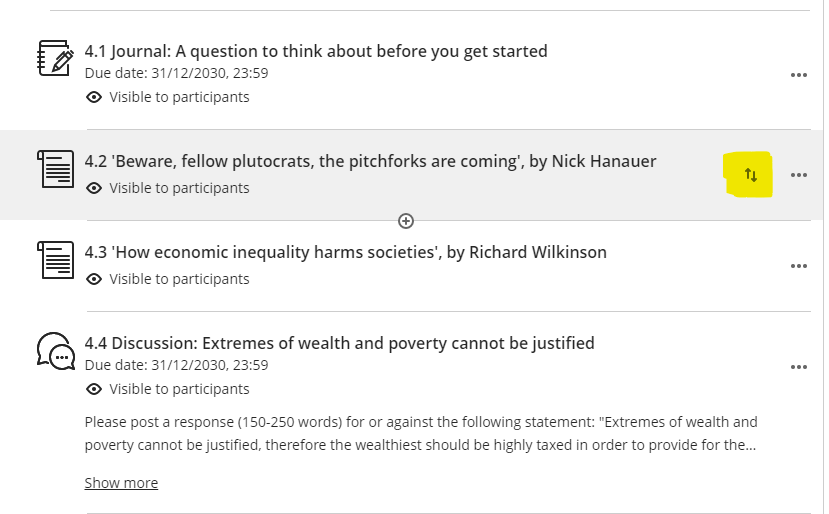
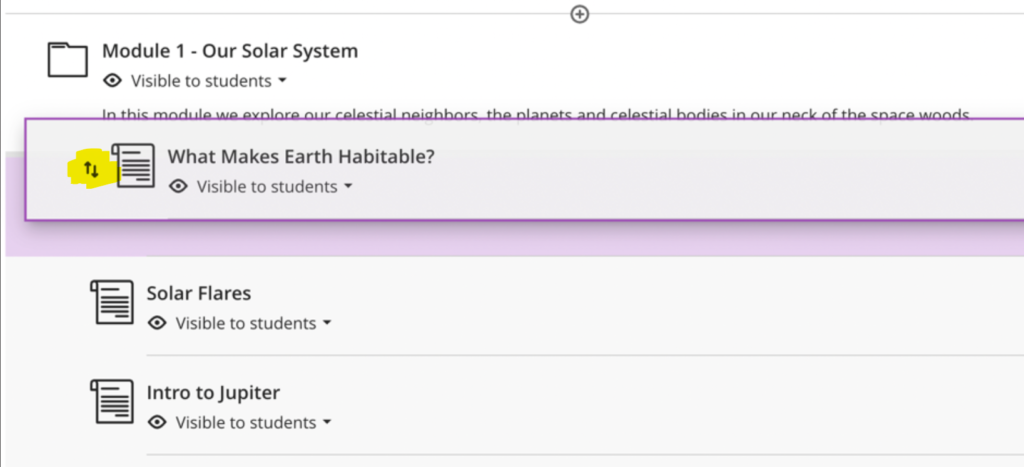
Course links
As well as adding links to external web sites, etc., following December’s upgrade, staff will be able to add internal links to items already in an Ultra course. To create a course link, add a new link, and select ‘Create Course Link’.

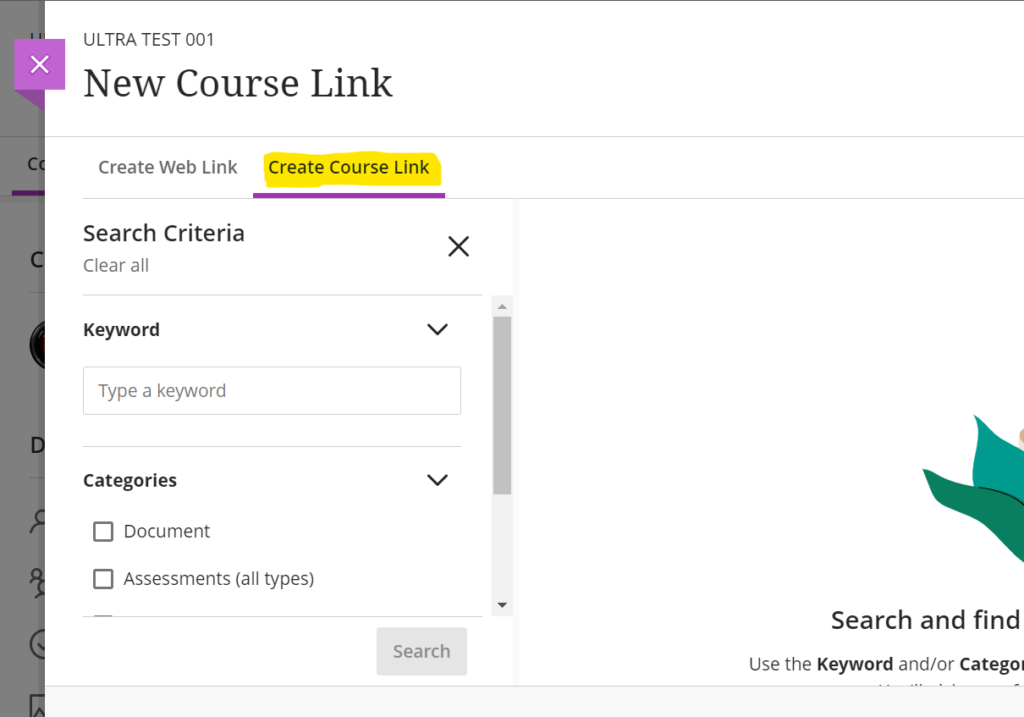
In this initial release of the course link tool there are some limitations, but the functionality is expected to develop and improve over the coming upgrades.
Linking Exceptions
- In this release, staff cannot create course links using the content editor.
- In this release, staff cannot create course links to folders, learning modules, discussions, and web links.
- Course links to learning modules where force sequence is enabled cannot be created. This is because links could allow users to access something they should not yet access. If a course link to a learning module exists, it will not be possible to enable forced sequence.
Copying Content
When a course is copied into a new course, course links are updated to link within the new course. However, there are exceptions:
- In this release, staff cannot copy course links for documents and third-party LTI content, i.e., course links to anything originally added via the content market, e.g., Turnitin assignments, Kaltura videos, Leganto reading lists.
- When copying or converting from an Original course, the copy process will exclude course links for folders, learning modules, and web links.
Single student progress report
Following on from last month’s upgrade, in which Blackboard introduced the ability for staff to find out more about how their students were interacting with Ultra courses, December’s upgrade adds additional functionality to the course analytics options.
When in grid view in the Ultra gradebook, selecting a student’s name will open up the student grades overview page, which shows an overview of all of that student’s grades in the course. After the December upgrade, staff will be able to view a progress report for a student, as well as details of the last time that the student was active in the course, along with a student activity link.
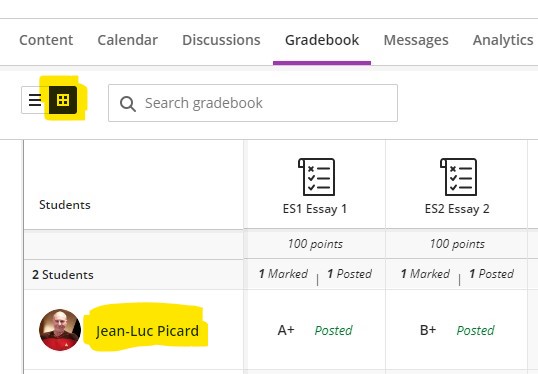
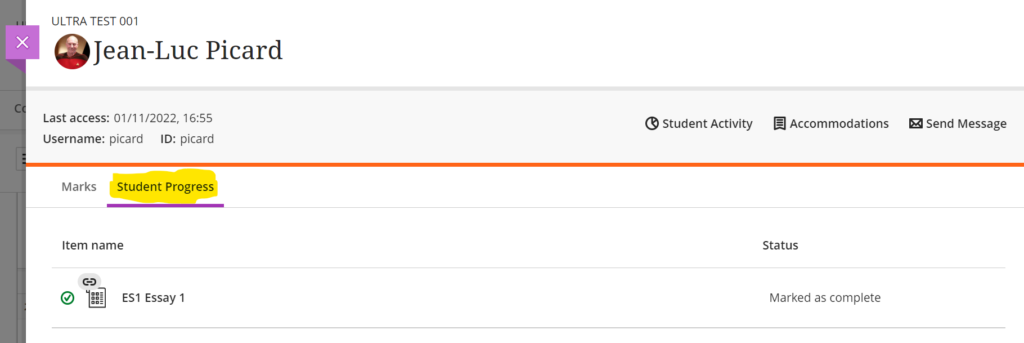
Improvements for copying content
When copying content into an Ultra course, the copy content panel is quite narrow, which can make it difficult to navigate. December’s upgrade introduces a new, expanded copy content panel.
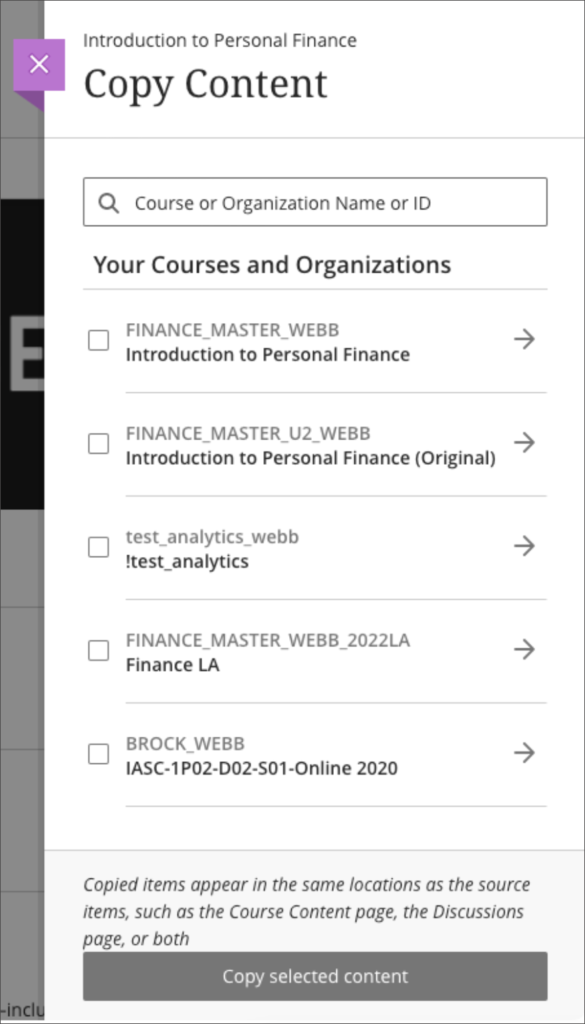
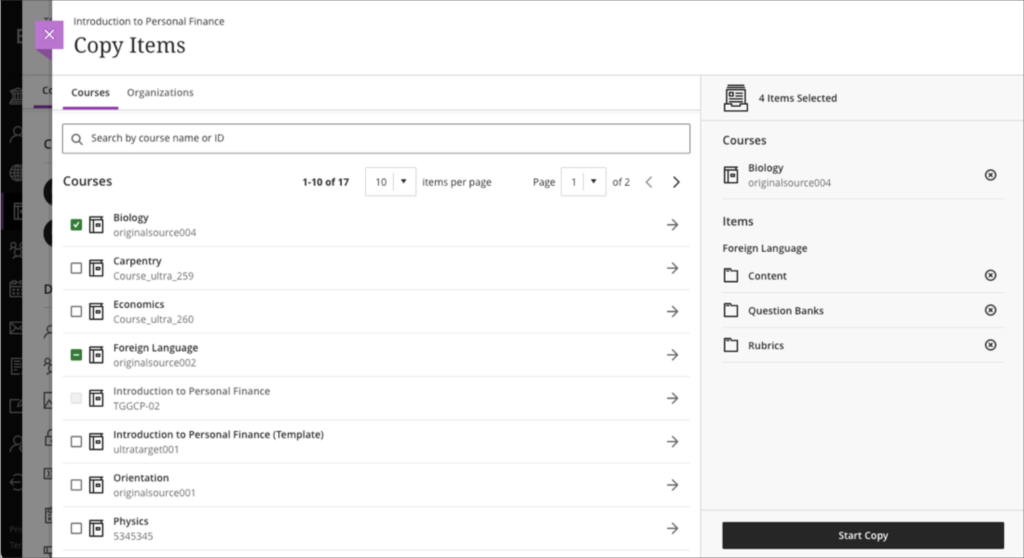
Staff can find out more about copying content into Ultra courses at: Blackboard Help – Copy Content from Other Courses
Question banks descriptions and search
Following December’s upgrade, staff will be able to add a description to a question bank. These descriptions may be useful for noting the topics or objectives the questions cover. The question bank description is displayed with the question bank title on the question banks page.
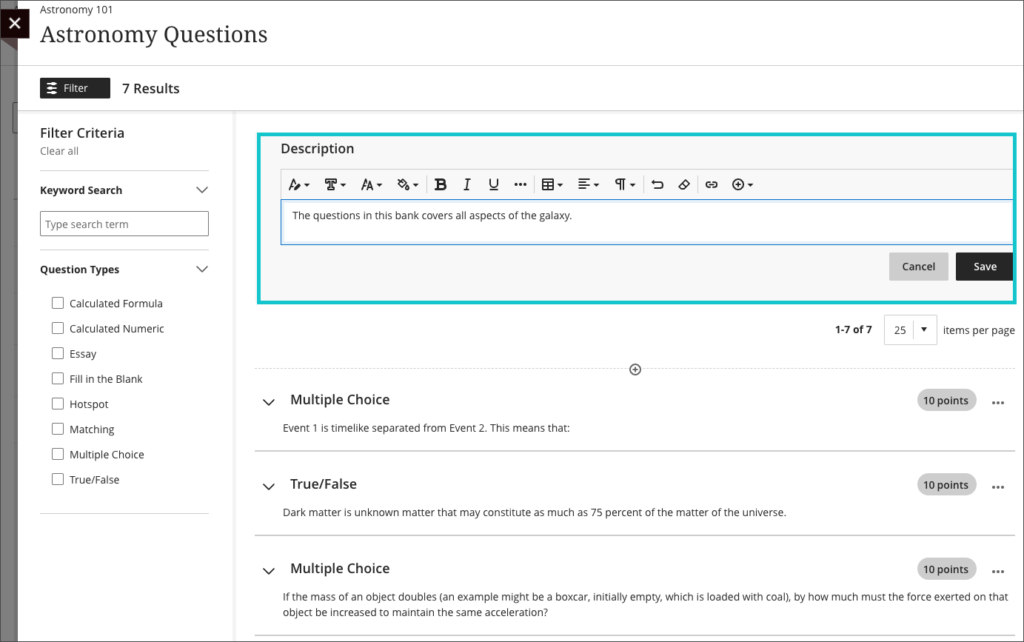
December’s upgrade will also bring in the option to search questions banks, with the search facility searching both the name and the description fields of the question bank.
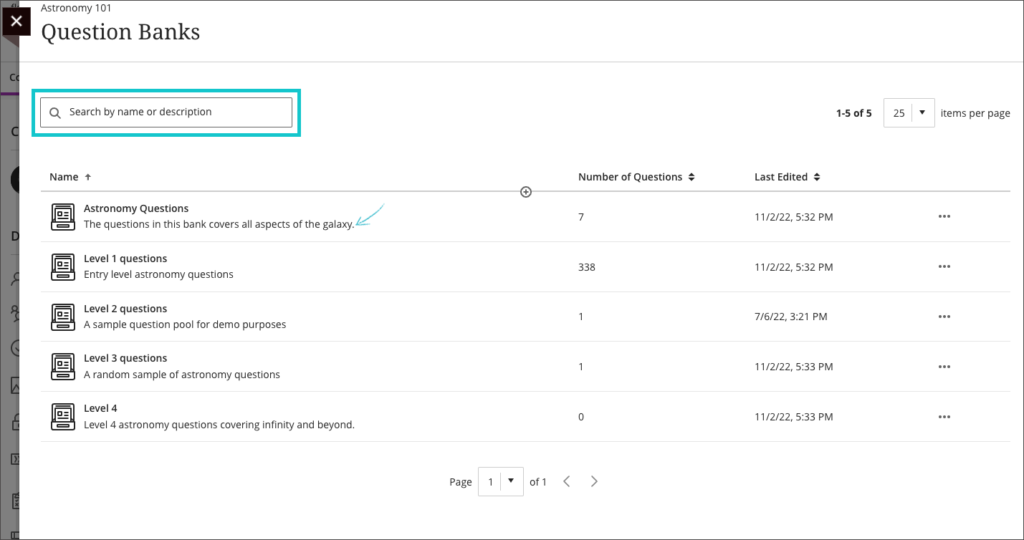
Staff can find out more about using question banks at: Blackboard Help – Question Banks
Simpler exit actions for student preview
December’s upgrade will bring in simpler exit process when viewing a course in student preview mode, allowing staff to exit in two clicks, instead of three.
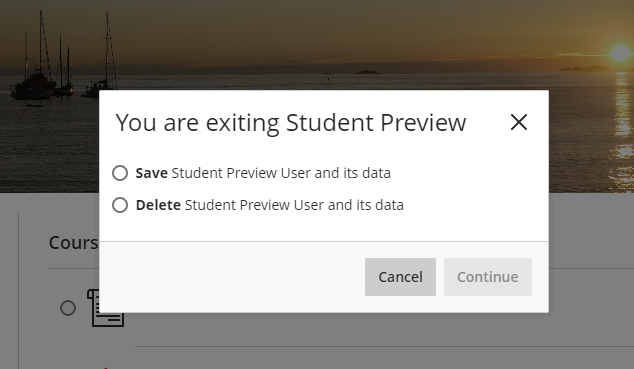
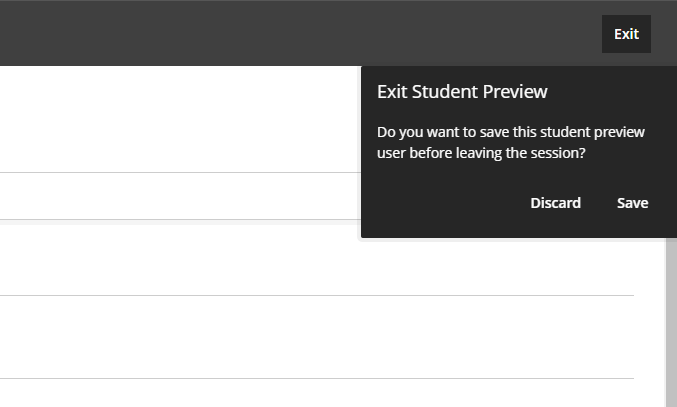
Improvements to ‘needs grading’ count for Blackboard Ultra assignments
In addition to the above improvements, December’s upgrade also improves the way that the needs grading count works, as it has sometimes provided an incorrect count of the number of items which required grading when assessing work with multiple attempts where ‘last attempt with a grade’ or ‘first attempt with a grade’ was selected in ‘Mark attempts’ in the assignment settings.
More information
As ever, please get in touch with your learning technologist if you would like any more information about the new features available in this month’s upgrade: https://libguides.northampton.ac.uk/learntech/staff/nile-help/who-is-my-learning-technologist
Blackboard’s November upgrade will be available from the morning of Friday 4th November. The November upgrade includes the following new features, many of which were specifically requested by staff in our ‘What new features do you want to see in your Ultra courses?‘ survey:
- Hotspot questions in Ultra tests
- Course activity report under the analytics tab in Ultra courses
- Student course access data available in student grades overview
- Improved grade history report available in the Ultra gradebook
- ‘Sticky’ Ultra gradebook view
- Turnitin icon is displayed in Turnitin assignments in Ultra and Original courses
- All content market icons appear alongside the content item in Ultra courses
- Improvements to unread messages indicator
Hotspot questions in Ultra tests
Following the November upgrade, staff will be able to use hotspot questions in Ultra tests.
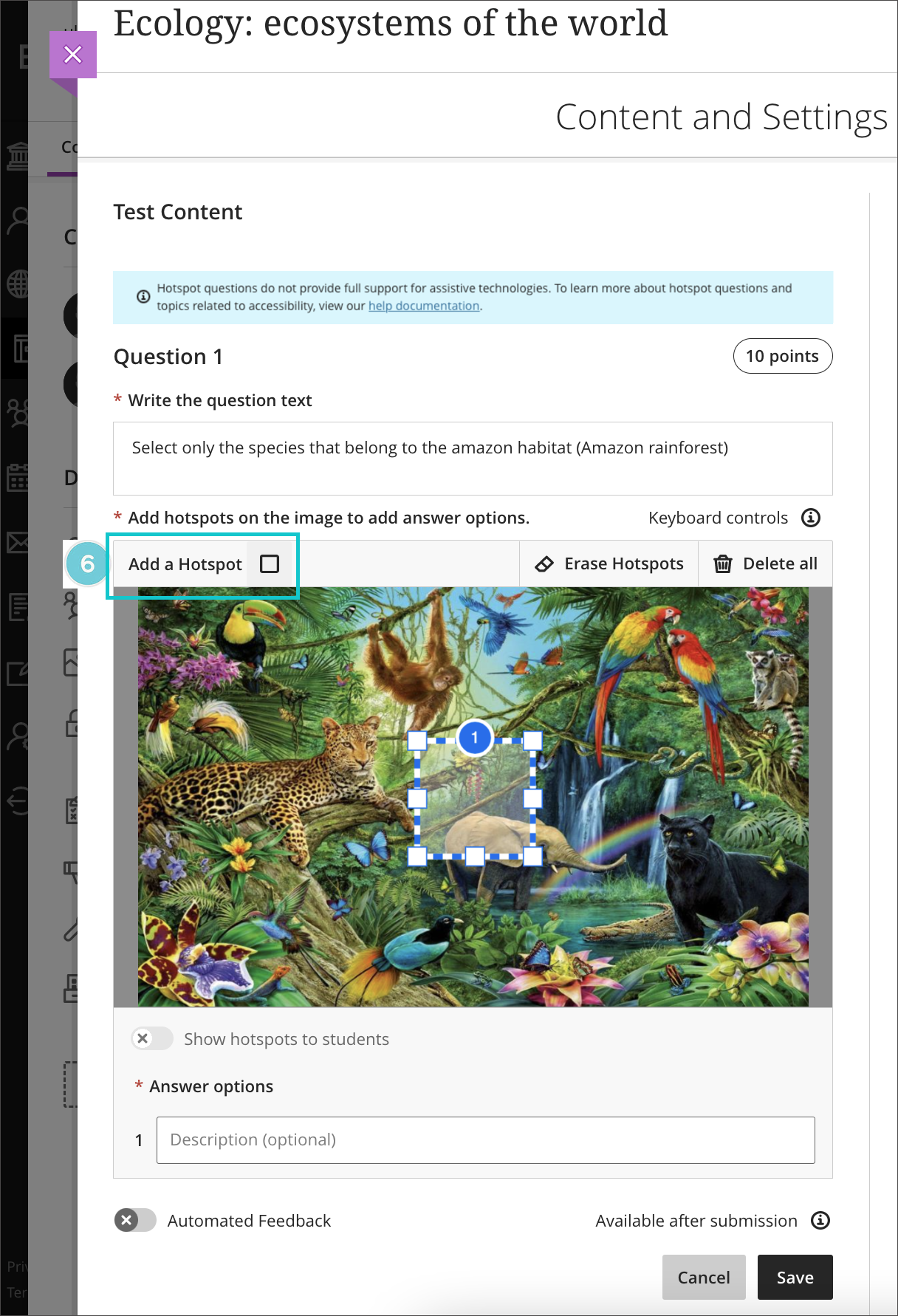
More information about how to add and use hotspot questions is available at:
Course activity report under the analytics tab in Ultra courses
Staff are keen to know more about student activity in their NILE courses, and October’s upgrade saw the introduction of student progress reports for course content items in Ultra courses.
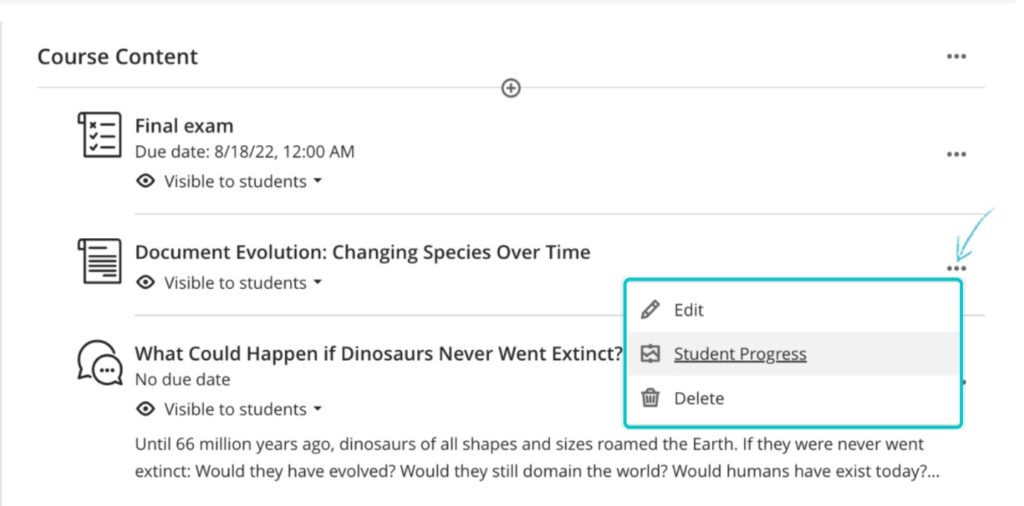
Following on from this, the November upgrade introduces a new feature in the ‘Analytics’ section of Ultra courses, where staff can find out more about students’ activity in their courses.
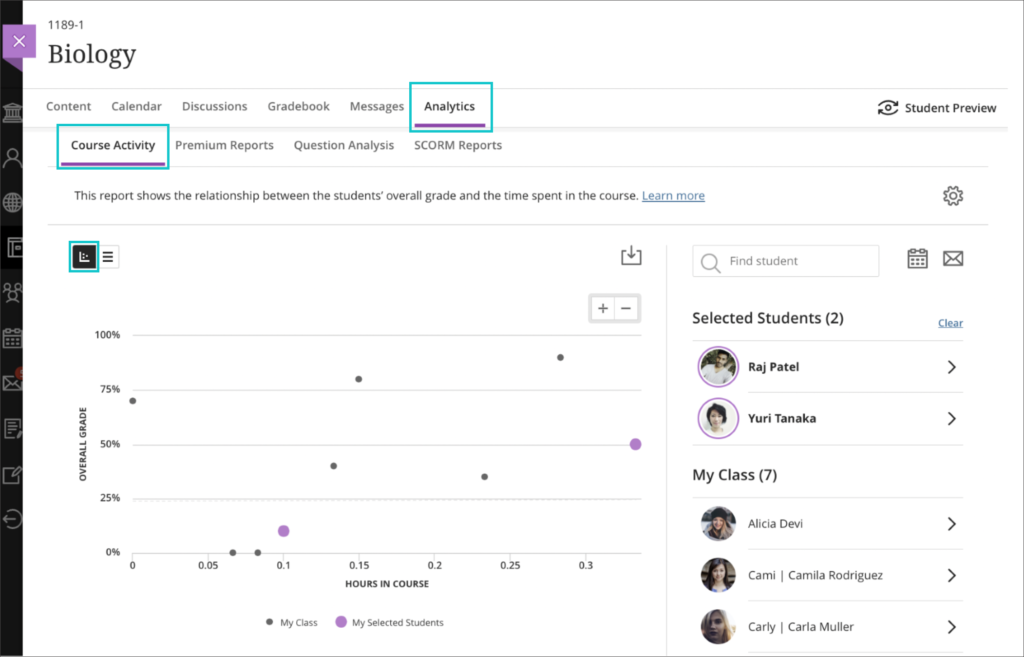
From here, staff can view reports about their students’ course activity related to grades, and individual students’ course activity data.
More information about Ultra course analytics is available from:
- Blackboard Help – Course Activity Related to Grades
- Blackboard Help – View Individual Student Course Activity Data
Student course access data available in student grades overview
When in grid view in the Ultra gradebook, selecting a student’s name opens up the student grades overview page, which shows an overview of all of that student’s grades in the course. After the November upgrade, the student grades overview will include details of the last time that the student was active in the course, along with a ‘Student Activity’ link which, when selected, will provide more details of the student’s activity in the course over time.

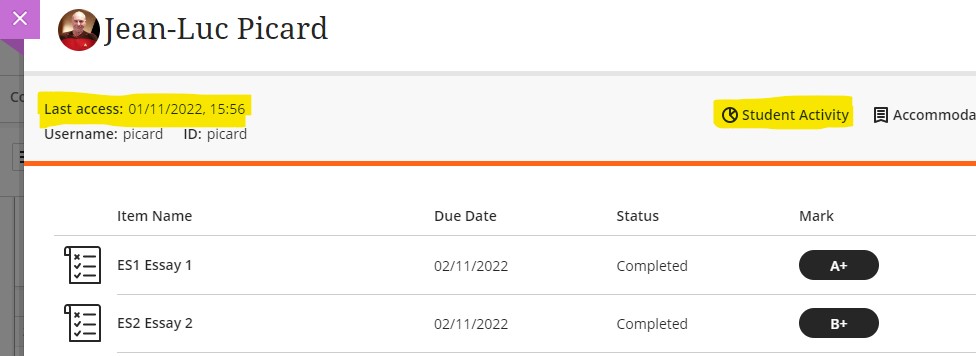
Improved grade history report available in the Ultra gradebook
Following the November upgrade, staff will be able to able to download a more detailed grade history report in the Ultra gradebook. When downloading marks, staff will be able to:
- Select which gradebook items to include in the download,
- Include deleted items, and,
- Select timeframes to optimise the amount of information downloaded.
The download file report will include additional information
- Student username
- Grade category
- Submission receipt: The submission receipt number
- Submission attempt: The number of the submitted attempt
These changes will make it easier for staff to access and search the log of changes to student grades.
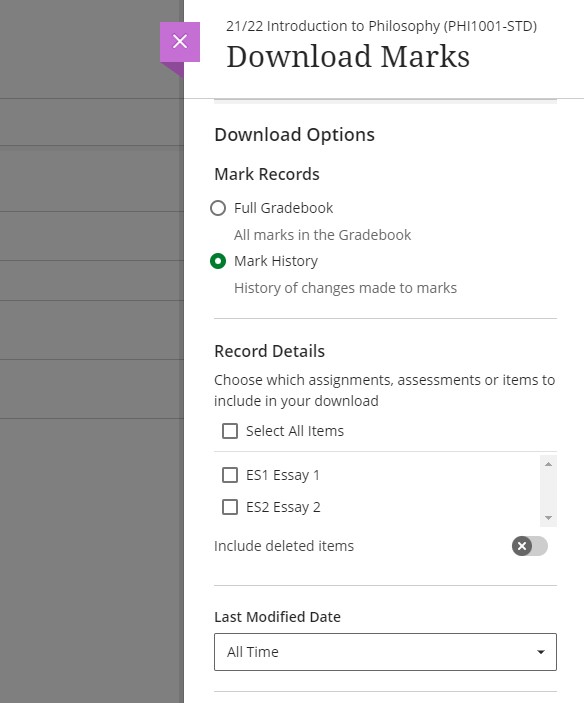
‘Sticky’ Ultra gradebook view
November’s upgrade will make the Ultra gradebook view ‘sticky’, meaning that Ultra will remember your last gradebook view, list or grid, and will always open the gradebook in that view. If you change your gradebook view, Ultra will then update your preference and open the gradebook in your new preferred view.
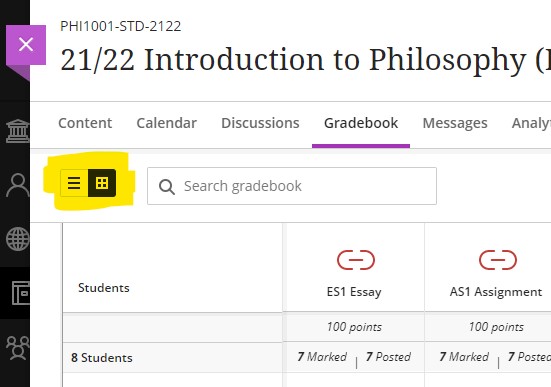
Turnitin icon is displayed in Turnitin assignments in Ultra and Original courses
Following the November upgrade, all new and existing Turnitin assignments in Ultra and Original courses will be more clearly identifiable as the Turnitin icon will be displayed to staff and students next to the assignment.
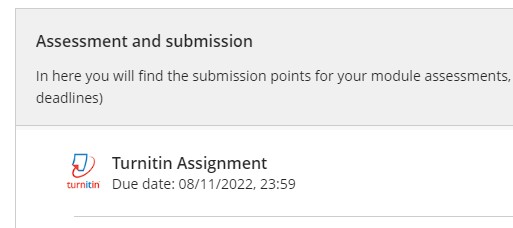
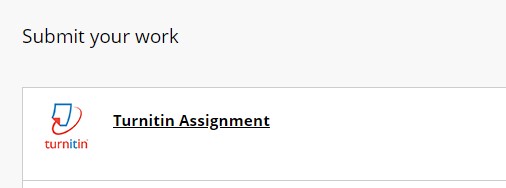
All content market icons appear alongside the content item in Ultra courses
Following on from previous item, all items selected from the content market and added to Ultra courses will, after the November upgrade, be displayed with their icons as shown in the content market. Existing items in Ultra courses which have been selected from the content market will be automatically updated to display the correct icon. This will make it easier for staff and students to identify and locate particular types of content in their Ultra courses.
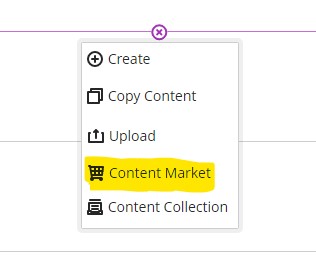
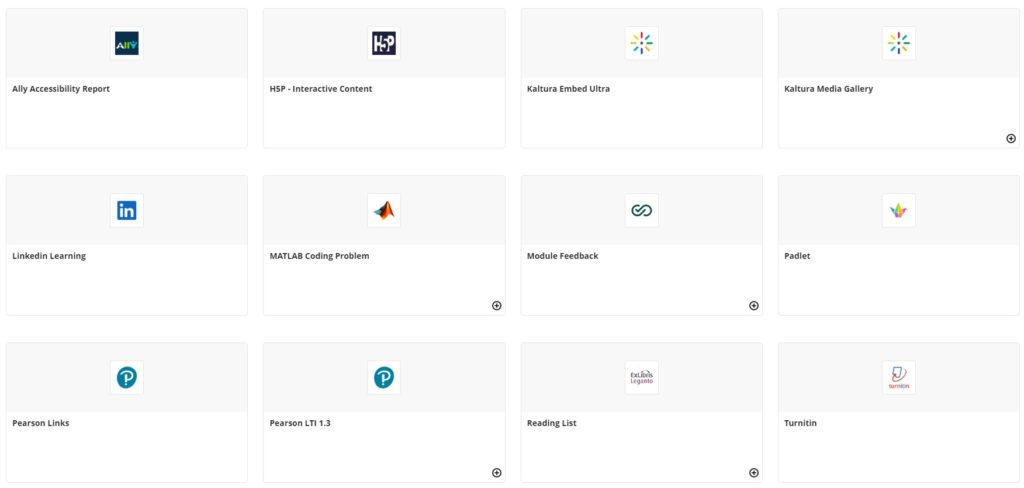
Improvements to unread messages indicator
The current unread messages indicator does not quickly and easily indicate in which course the unread message is located. After the November upgrade, the unread messages indicator will be more prominent. In future upgrades, courses with unread messages will be automatically shown at the top of the messages panel in NILE.
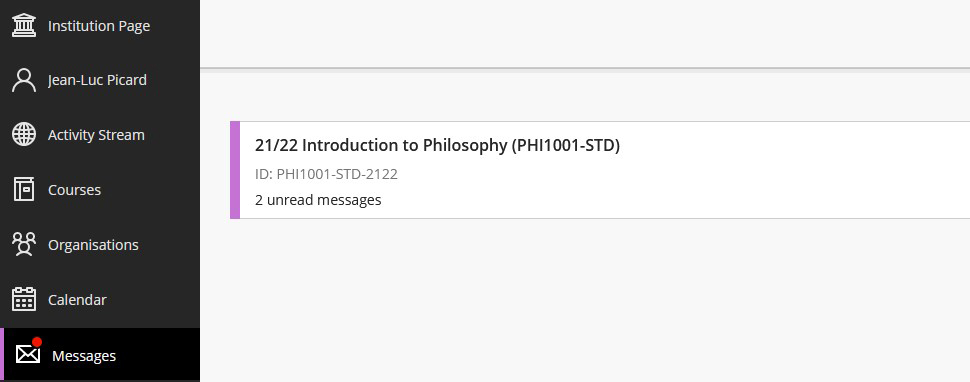
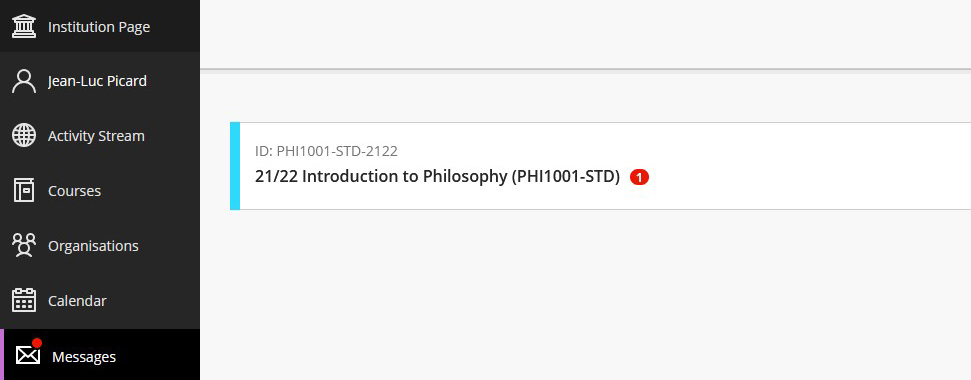
More information
As ever, please get in touch with your learning technologist if you would like any more information about the new features available in this month’s upgrade: https://libguides.northampton.ac.uk/learntech/staff/nile-help/who-is-my-learning-technologist
Details of this month’s upgrade, and all previous upgrades, are available at: https://blogs.northampton.ac.uk/learntech/category/nile-update/
Blackboard’s October upgrade will be available from the morning of Friday 7th October. The highlight of the October upgrade is the addition of student engagement reports in Ultra courses, which will allow staff to see the extent to which students are engaging with course content. (Please note that progress tracking must be turned on for the student progress reports to be available.) Also included in the October upgrade is improved access to student grades overview in the gradebook in Ultra courses, enhanced auto save capability in the content editor in Ultra tests & assignments, and more accessible maths formulas in Ultra courses.
Student engagement reports for course content in Ultra courses
After the October upgrade, staff will be able to view reports which show the extent to which students are interacting with course content in Ultra courses.
The new reports allows instructors to select a piece of content and view:
- Students who have not yet opened content;
- Students who have opened or started viewing content; and
- Students who have marked the content as complete.
The report includes the date and time an action occurred (e.g., when a student started viewing content). Staff may sort by student name or progress status. Staff can act based on this information by sending an individual or bulk message with a blind copy to each student.
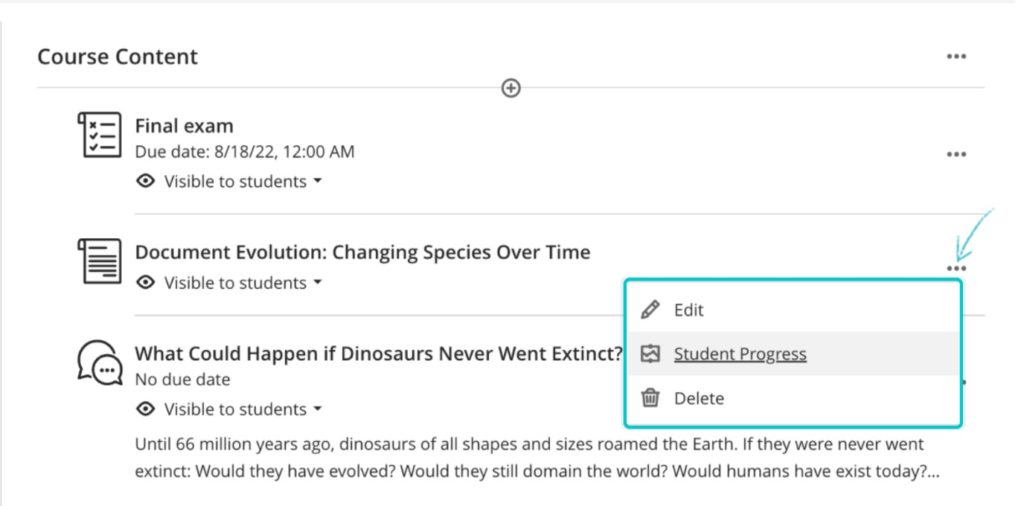
Please note that progress tracking must be turned on for the student progress reports to be available.
More information about progress tracking in Ultra courses is available from: https://help.blackboard.com/Learn/Instructor/Ultra/Courses/Progress_Tracking
Improved access to student grades overview in the gradebook in Ultra courses
Prior to the October upgrade, when in the grid view of the gradebook, when staff selected a student, the student’s account information appeared. Following the upgrade, an overview of the student’s performance on assessments will be displayed when selecting a student in the grid view of gradebook.
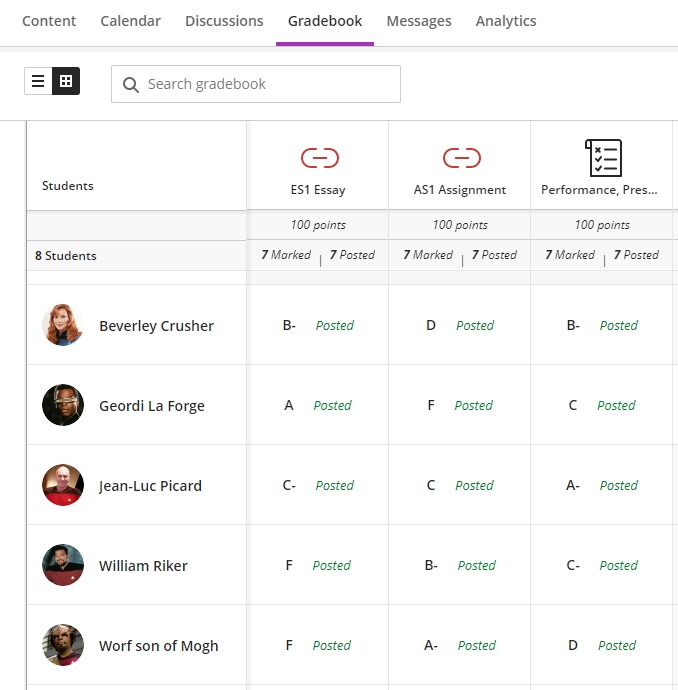
Enhanced auto save capability in the content editor in Ultra tests & assignments
Following the October upgrade, student responses entered in the Ultra content editor will auto-save two seconds after the student stops typing. The ‘last saved’ time will also be displayed at the bottom of the assessment.
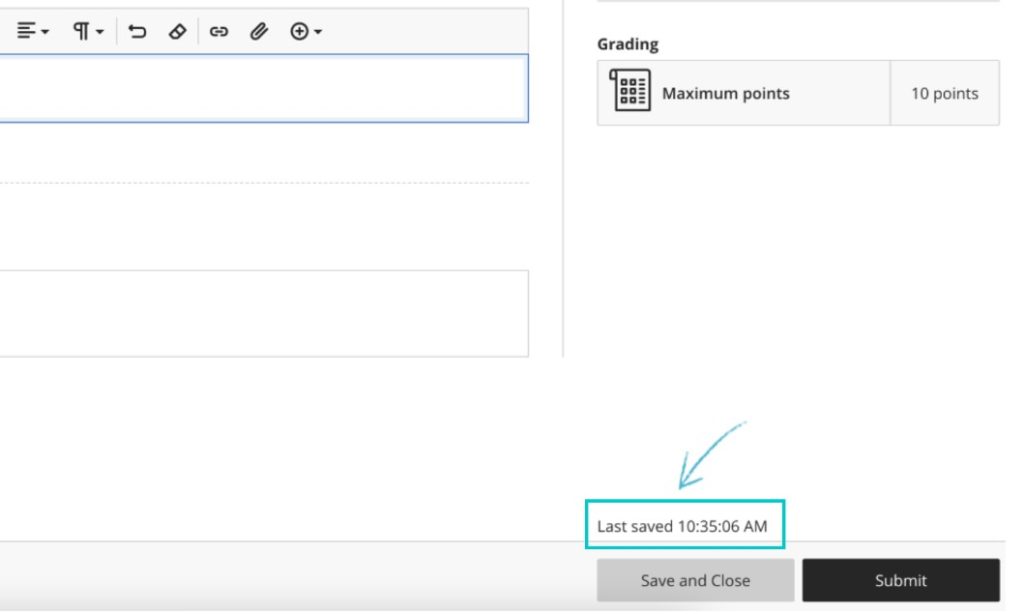
In addition, if there is a disruption in connectivity, students will receive a ‘Connection lost’ warning. This warning informs students that they must act to re-establish the connection. When the connection is restored, the student’s work will be saved automatically.
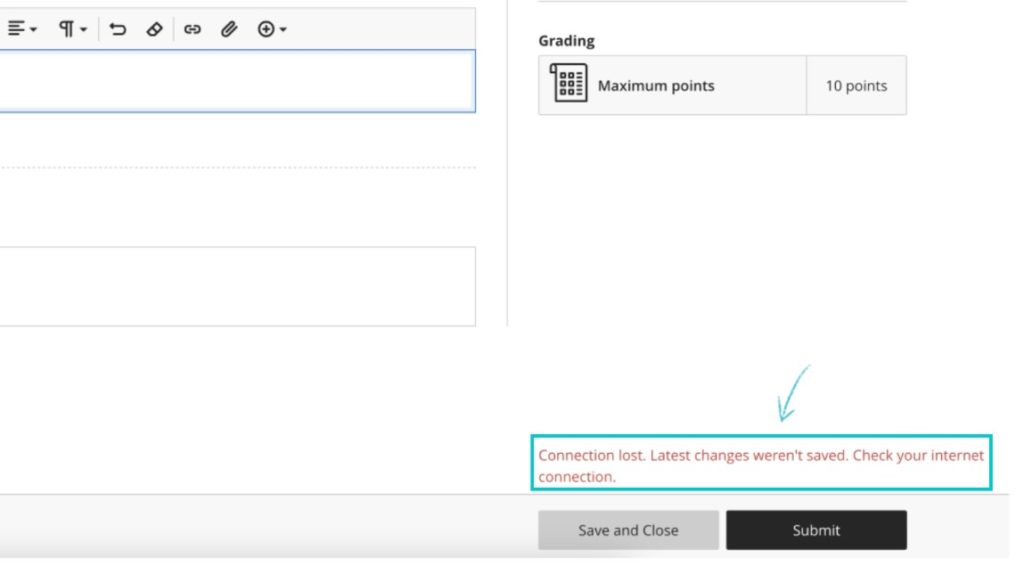
Maths formulas accessible with screen readers in Ultra courses
After the October upgrade, staff and students will be able to use screen readers to access maths formulas when creating, editing and viewing content. This update will help people who use a screen reader independently access maths formulas. This new functionality also supports easier content creation since no added effort is needed to make the math formulas accessible.
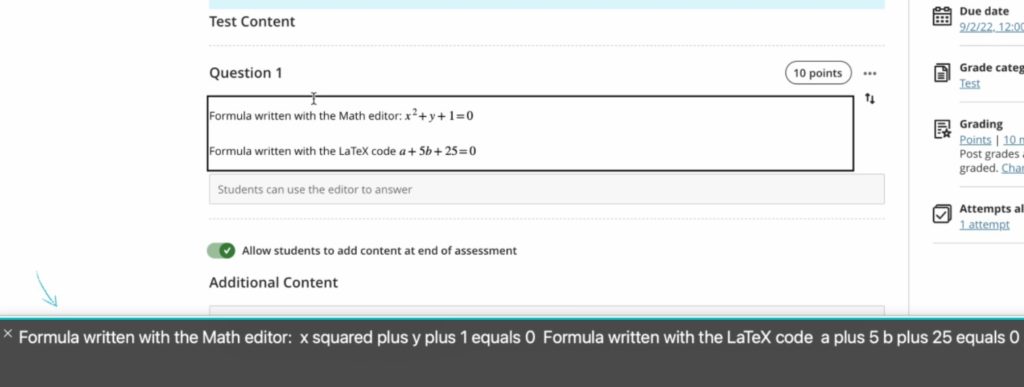
Course name appears in browser tab in Ultra courses
Staff and students often open different courses in separate browser tabs. Following the October upgrade, the course name will appear in the browser tab in order to help staff and students locate the correct tab.
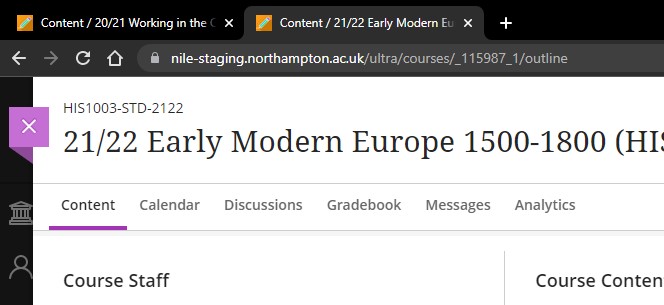
More information
As ever, please get in touch with your learning technologist if you would like any more information about the new features available in this month’s upgrade: https://libguides.northampton.ac.uk/learntech/staff/nile-help/who-is-my-learning-technologist
Blackboard’s September upgrade will be available from the morning of Friday 2nd September, and includes improvements to the Ultra courses copy tool, including the ability to more easily copy rubrics into Ultra courses, and removing the option to accidentally copy a course back into itself. Also included in the upgrade are improvements to question banks sorting controls, the ability for staff to both reply to and grade a discussion on the same page, and improvements to the Ultra test timer for students.
The ability to add preferred pronouns and name pronunciations is available already in NILE, and Microsoft Immersive Reader will become one of Ally’s alternative formats at the end of August.
Add your preferred pronouns and name pronunciation to your NILE profile
Brand new to NILE this summer is greater support for pronouns and name pronunciation. This feature is available now. Staff and students who would like to can now add a written and an audio pronunciation of their name, and can select their preferred pronouns. If these are added, they will be displayed on the Ultra course profile cards. Staff and students can also add their photo to their course profile too. Adding a photo, selecting your preferred pronouns, and adding a pronunciation can all be done from the NILE profile page.
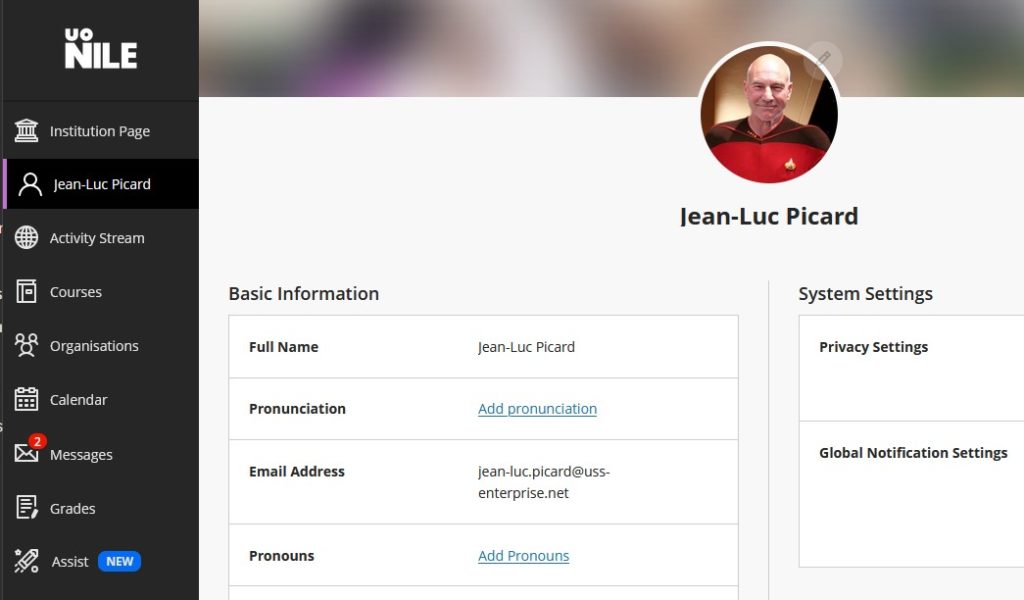
Copy rubrics into Ultra courses
Following the September upgrade, it will be much easier to copy rubrics into Ultra courses from both Original and Ultra courses. When copying content, course rubrics will be available to select, and either all or selected rubrics can be chosen to copy.
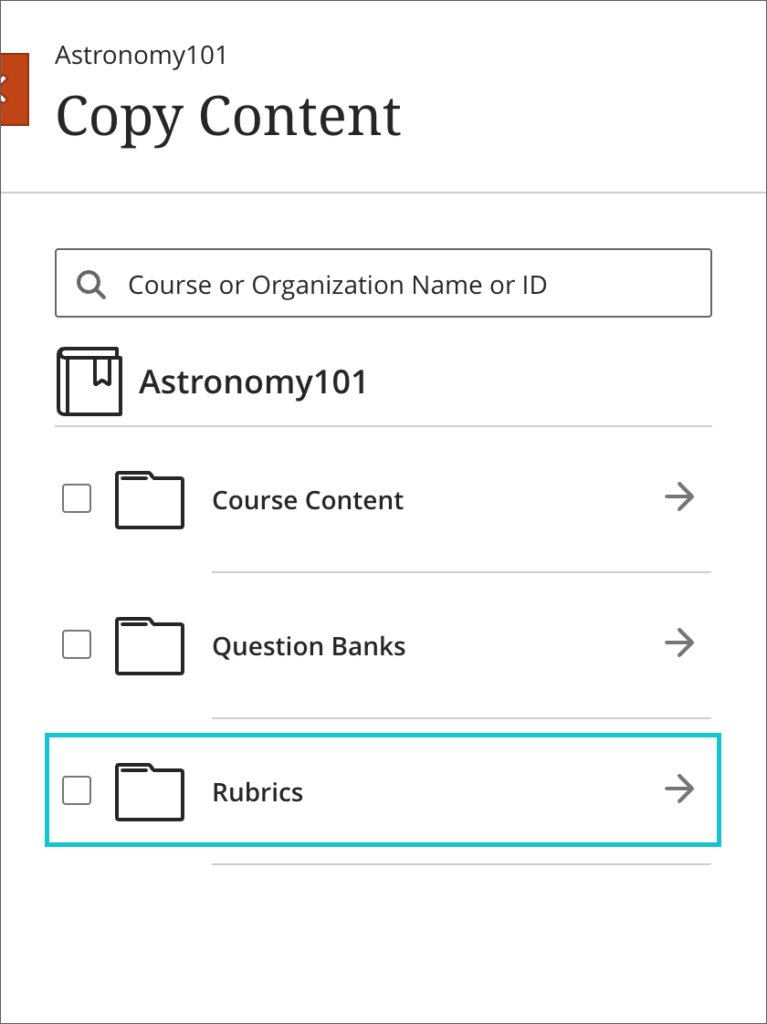
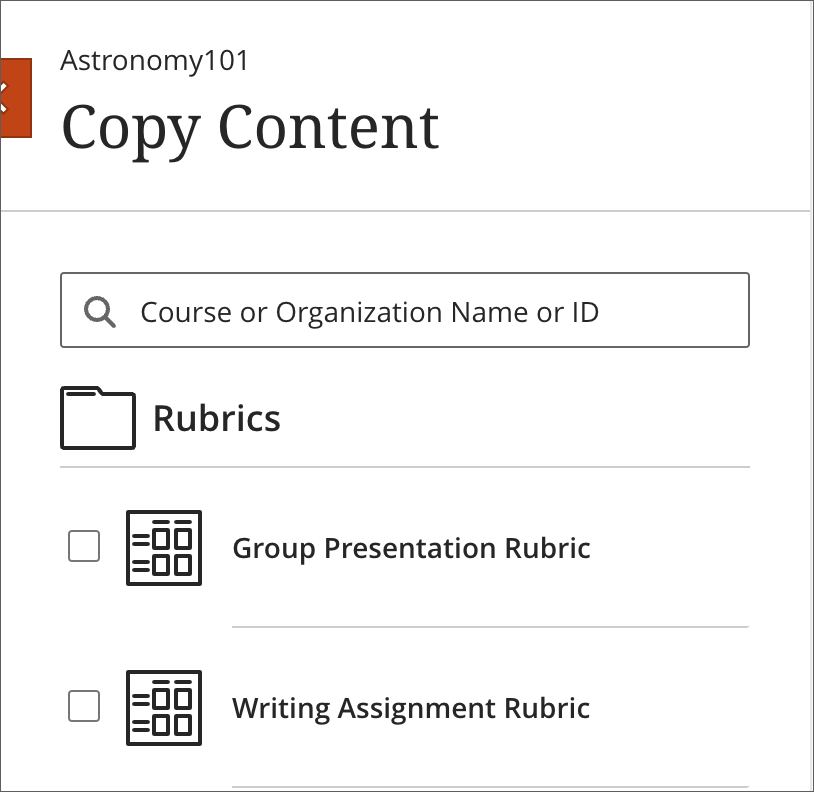
Ultra courses cannot be accidentally copied into themselves
Prior to the September upgrade, when copying content from one course to another, it was possible to select the same Ultra courses as both the source and the destination, thus copying an entire course into itself. After the upgrade, while individual content items can be copied from a course back into itself, the entire course cannot be, and will be greyed out in the list of possible course copy sources. However, staff can still go into the greyed out course and pick selected items to copy.
In the example below, Astronomy 101 cannot be selected as the copy source, as the instructor is already in Astronomy 101 (i.e., it is the copy destination). However, the instructor can select the arrow and go into Astronomy 101 and pick out selected content items to copy back into the Astronomy 101 course.
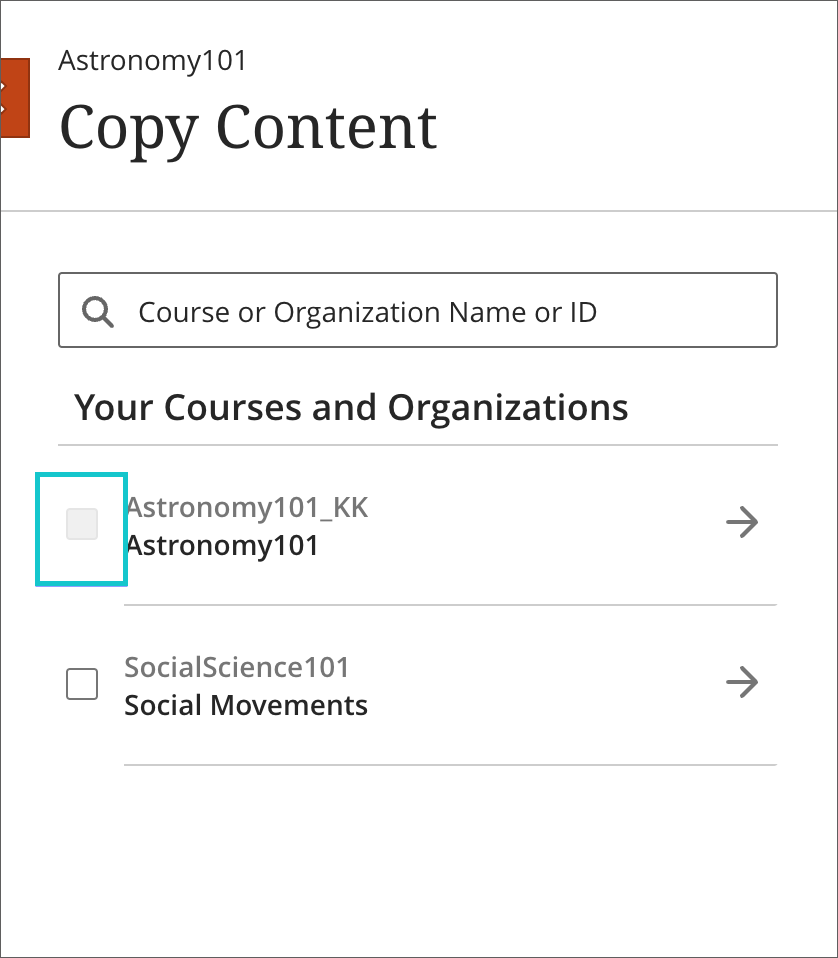
Improvements to question banks sorting controls
After September’s upgrade, question banks in Ultra courses will have improved navigation and sorting controls, making it easier for staff to more easily sort question banks based on the name, number of questions in a bank, or the last edited date.
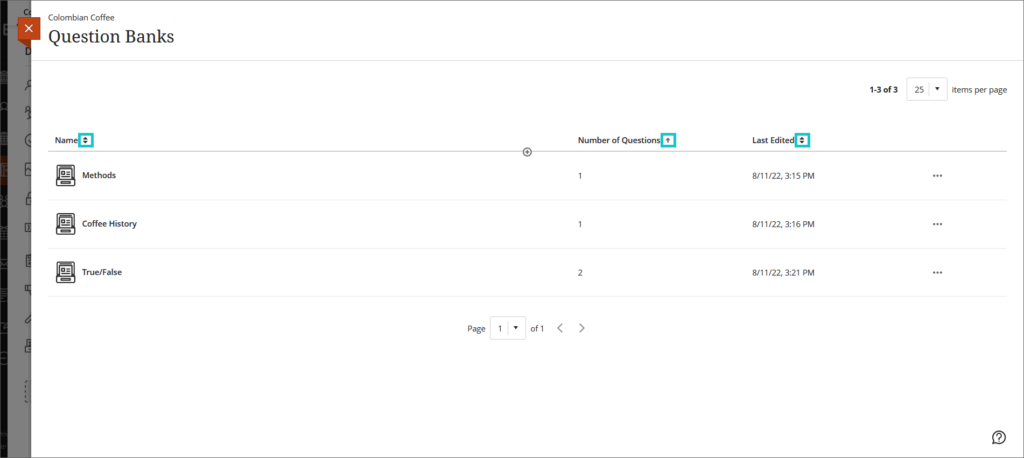
You can find out more about using question banks at: https://help.blackboard.com/Learn/Instructor/Ultra/Tests_Pools_Surveys/ULTRA_Reuse_Questions/ULTRA_Question_Banks
Discussion replies in Ultra courses are available from the grading page
Prior to the September upgrade, it was not possible to reply to a student’s discussion post when grading the discussion. Following the upgrade, staff can grade discussions, and reply to discussion posts from the discussions grading page.
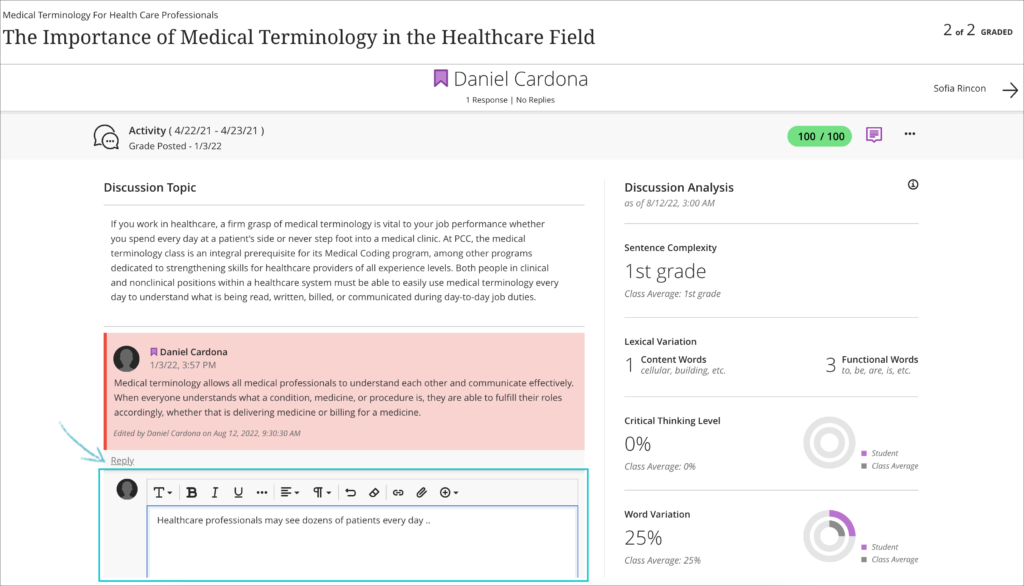
Improvements to the Ultra test timer for students
When taking a timed assessment, it is important for students to be aware of the time that remains to complete it. However, a fixed display of the timer can also add stress. To support various student preferences, Blackboard are introducing notifications for timed assessments. These notifications are less invasive yet keep the student informed.
- For assessments less than 10 minutes, there is no notification.
- For assessments less than 1 hour but greater than 10 minutes, there will be a single reminder when 10% of the time remains. For example, for an assessment with a 10-minute time limit, the notification will appear when 1-minute remains.
- For assessments longer than or equal to an hour, there will be an added notification when 50% of the time remains. For example, for an assessment with a one-hour time limit, the notification will appear when 30 minutes remain. A second notification will appear when 10% of the time remains.
- If a student has a time limit accommodation, a notification will appear when 10% of the extra time remains. If the extra time allowed is less than 10 minutes, there will be no added notification.
- If a student has an unlimited time accommodation, there will be no notifications for the time remaining.
All notifications for remaining time auto-dismiss after 20 seconds. If a student prefers, they can dismiss the notification
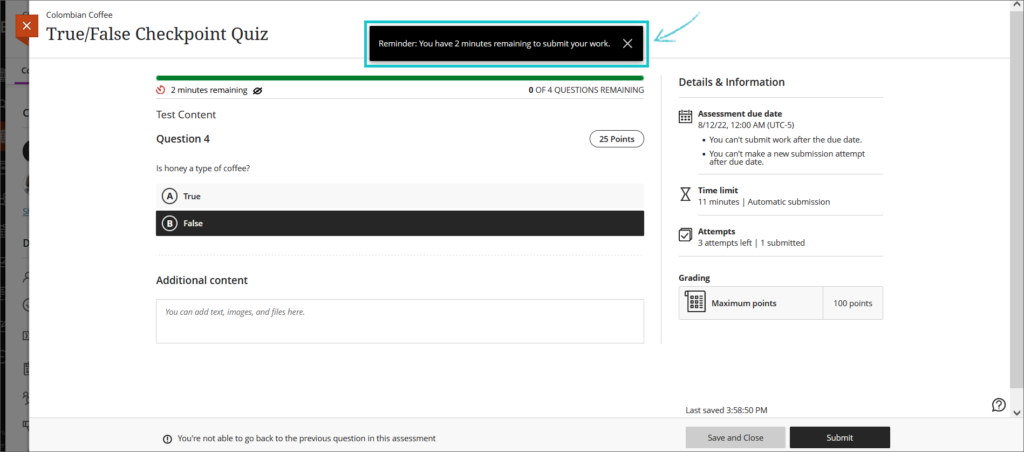
Microsoft Immersive Reader included as one of Ally’s alternative formats
At the end of August, prior to the September upgrade, users accessing content via Ally in Ultra and Original courses will be able to select Microsoft Immersive Reader as one of the alternative formats.
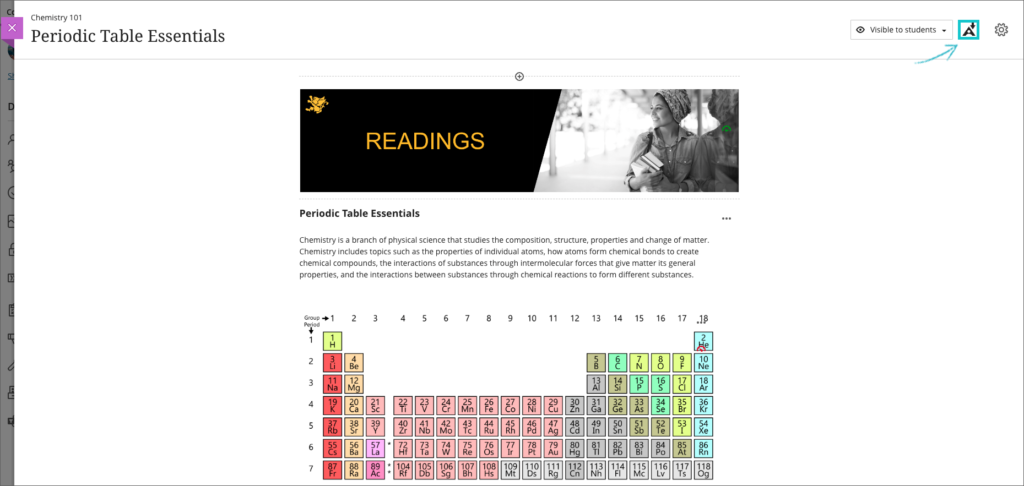
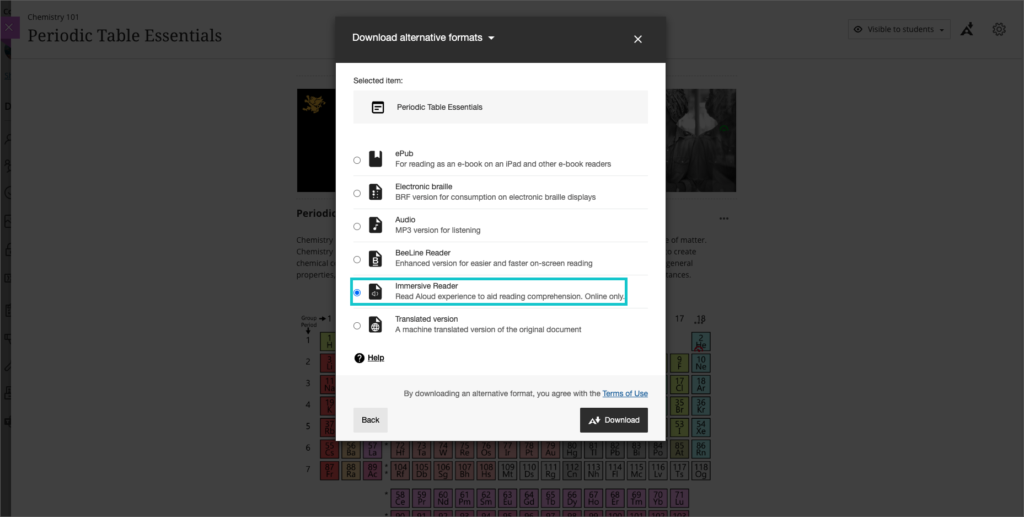
You can find out more about Ally at: https://help.blackboard.com/Ally/Ally_for_LMS/Instructor
And you can find out more about Microsoft Immersive Reader at: https://aka.ms/AllAboutImmersiveReader
More information
As ever, please get in touch with your learning technologist if you would like any more information about the new features available in this month’s upgrade: https://libguides.northampton.ac.uk/learntech/staff/nile-help/who-is-my-learning-technologist
Blackboard’s August upgrade will be available from the morning of Friday 12th August, and includes a fix for Turnitin assignments in Original courses, improvements to Ultra’s question bank functionality, more exceptions for student assignments in Ultra courses, better Ultra Gradebook filters, more frequent auto-saving of student work, and support for LaTeX equations in Ultra courses. Following the upgrade, staff will also be able to import groups to Ultra courses via CSV upload, and will be provided with more information when using the Ultra Messages tool as to whether messages are sent privately or not to students.
Turnitin problem in Original courses fixed
Currently, when setting up a Turnitin assignment in an Original course, staff manually hide the corresponding column in the Grade Centre in order to prevent students from seeing their grades prior to the feedback release date. However, every time the Turnitin assignment’s settings are edited, the corresponding column in the Grade Centre is automatically un-hidden and staff have to hide it again.
Following the August upgrade, although staff will still need to check that the Grade Centre column is hidden immediately after setting up the assignment, if the Turnitin assignment’s settings are edited the Grade Centre column will now remain hidden.
Ability to manage question banks in Ultra courses
Prior to the August upgrade, staff could import question banks into Ultra courses from Original courses and could re-use them. However, staff could not create new question banks in Ultra courses, or manage/edit the imported question banks. Following the August upgrade, staff will be able to:
- Create new, empty question banks in their Ultra courses
- View and search for questions within a question bank
- Add, edit, and delete all aspects of a question within new and existing question banks
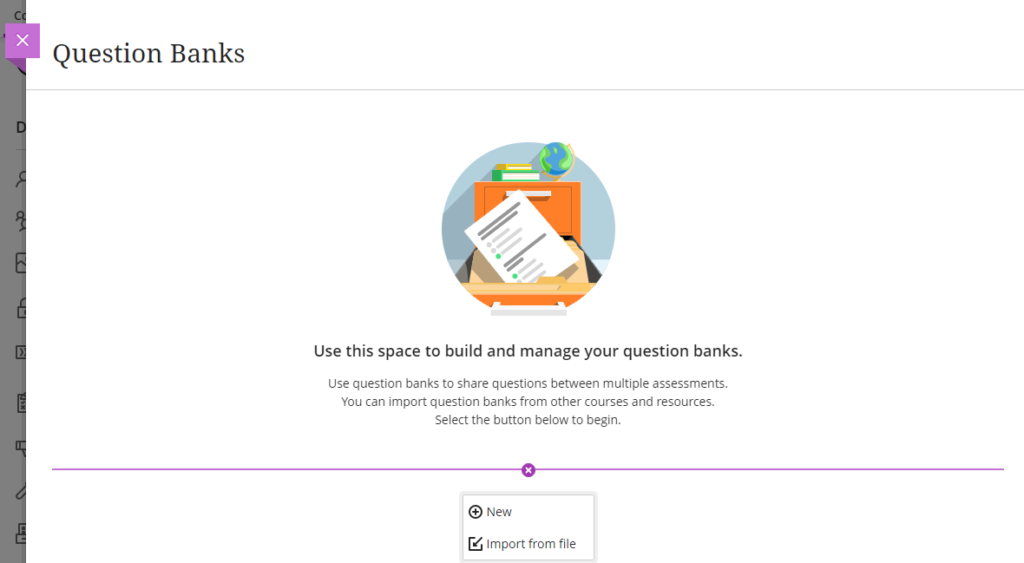
Question Banks can be created and managed via ‘Manage banks’ under Question Banks in the Details & Actions menu in Ultra courses.
Additional exceptions available for Blackboard assignments and tests in Ultra courses
Following the August upgrade, staff will be able to offer additional exceptions for individual students when using Blackboard assignments and tests in Ultra courses. The new exceptions options, which can be added from the Ultra Gradebook, allow individual students to be given a later due date, more submission opportunities, or to have access to the test or assignment submission point for longer.
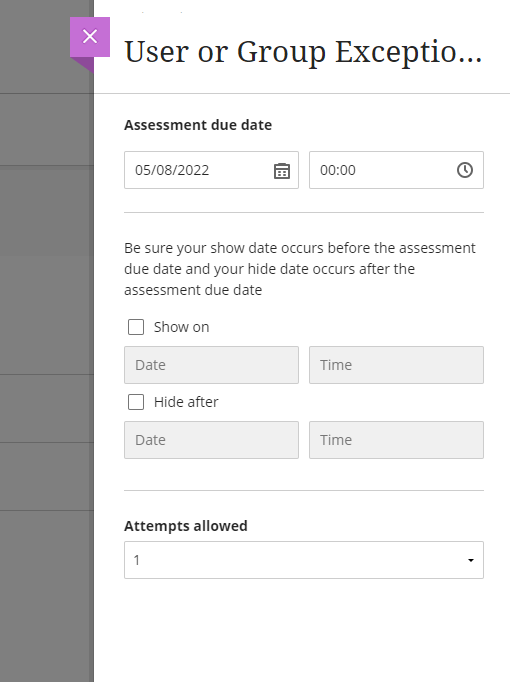
Improved Gradebook filters in Ultra courses
After August’s upgrade, staff will be able to filter students’ submissions in the Ultra Gradebook by both student status and/or marking status.
Under ‘Student Status’ staff will be able to select from:
- All Student Statuses
- No Submission
- Draft Saved
- Submitted
And under ‘Marking Status’ staff will be able to select from:
- All Marking Statuses
- Needs Marking
- Needs Posting
- Completed
- Nothing to Mark

Improved auto-save functionality for students when using the content editor in Ultra tests and assignments
If students are completing the written component of a test or Blackboard assignment in an Ultra course, their work will now auto-save when they stop typing for two seconds. Students will also see a message displaying the most recent auto-save time, and will be warned if their internet connection drops out.
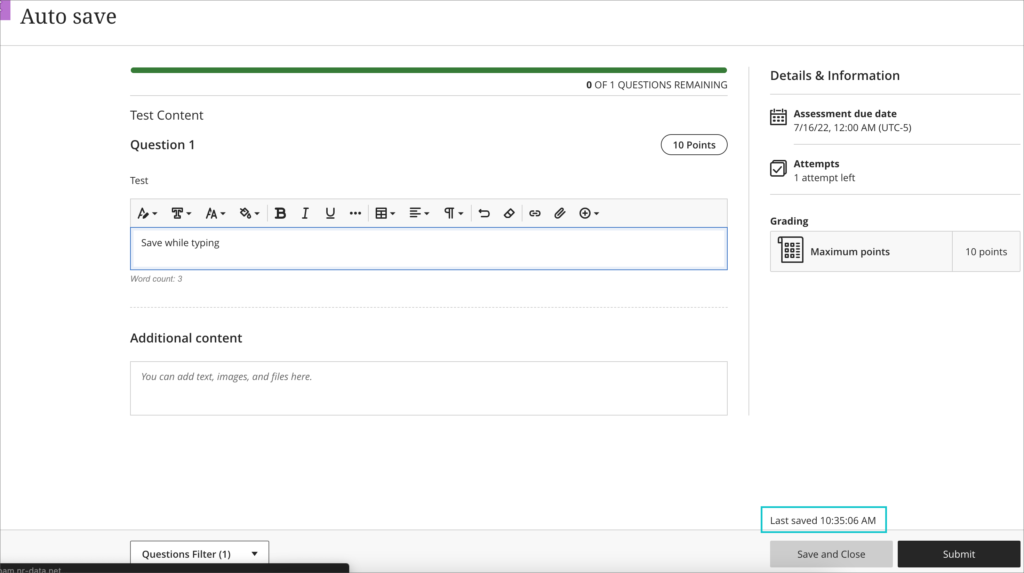
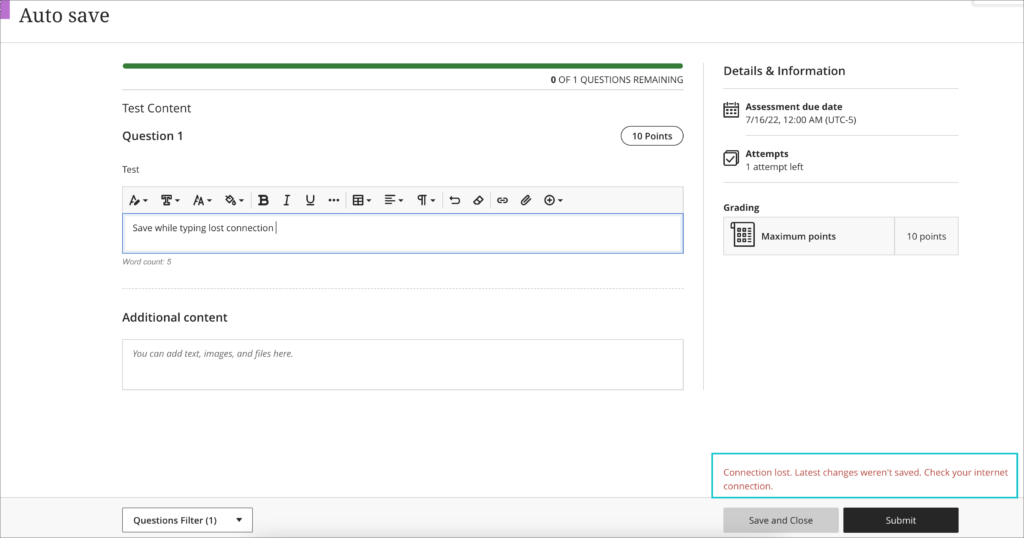
Improvements to LaTeX equation support in Ultra courses
As well as being able to create equations using the math editor, after the August update, staff using Ultra courses will be able to create LaTeX equations in the content editor. When the text is saved, the LaTeX equations will render as images.
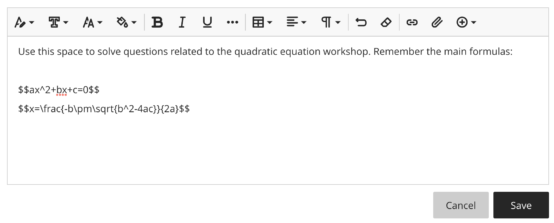

Import/Export group sets and members in Ultra courses
Currently, groups in Ultra courses have to be created manually. Following the August upgrade, staff will be able to import and export group sets and members into Ultra courses.

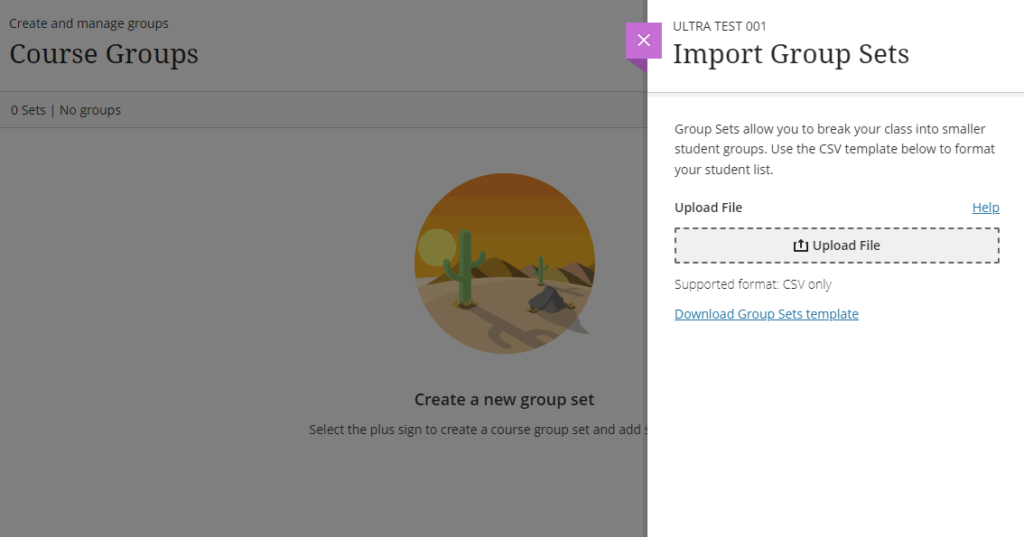
Improvement to the Messages tool in Ultra courses
After the August upgrade, messages sent from Ultra courses will declare to staff whether they are being sent to everyone in the group (i.e., all recipients can see who else got the message), or privately to multiple individuals. While it will not be possible to change the way that the messages are sent, this is planned for a future upgrade.
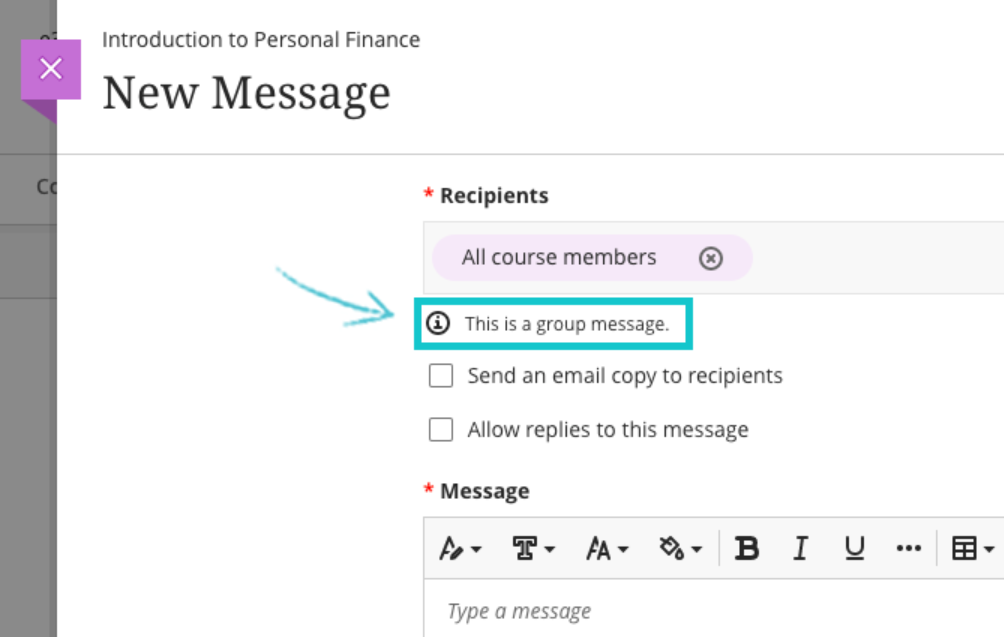
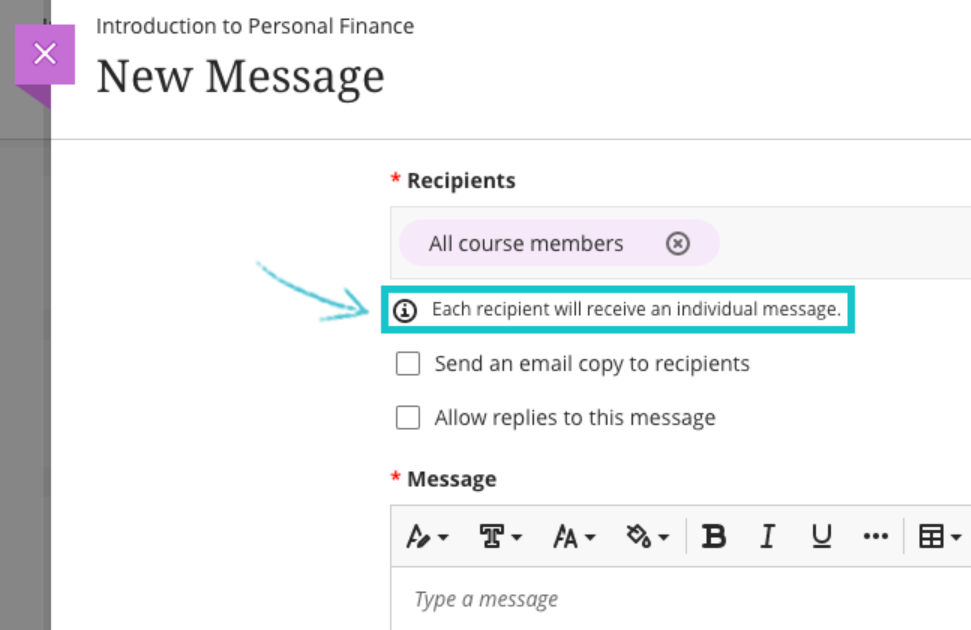
More information about safely messaging students from Ultra courses is available in our FAQ, Is it safe to message multiple students in Ultra courses in NILE?
More information
As ever, please get in touch with your learning technologist if you would like any more information about the new features available in the August upgrade: https://libguides.northampton.ac.uk/learntech/staff/nile-help/who-is-my-learning-technologist
Blackboard’s July upgrade will be available from the morning of Friday 8th July. The July upgrade includes the ability for staff to copy question banks into Ultra courses, and to prohibit backtracking in Ultra tests. Also included are improvements to the way that uploaded documents render inline in Ultra courses, and to the quality of the rendering of mathematical formulas created in the maths editor in Original and Ultra courses.
Copy question banks into Ultra courses
Currently, staff can copy a test from an Original or Ultra course into an Ultra course, but cannot copy a question bank. After the July upgrade, question banks will be available to copy into Ultra courses.
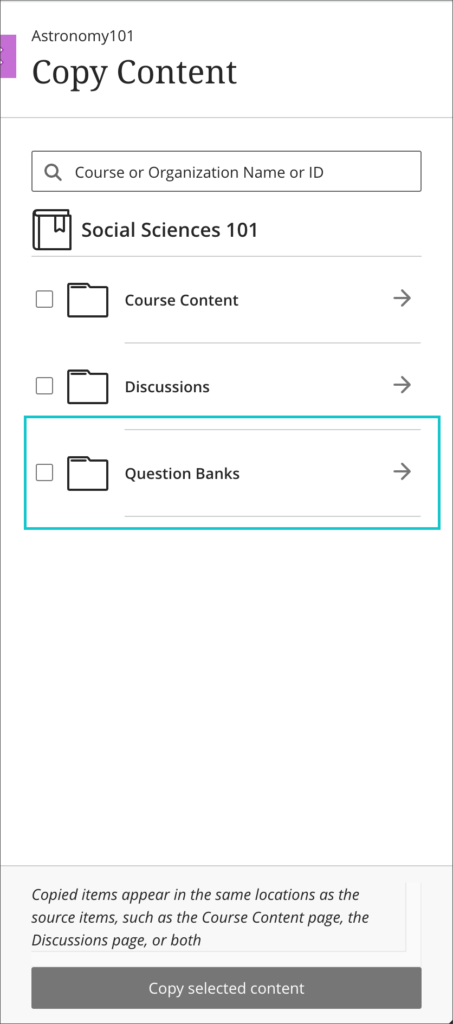
You can find out more about copying content into your Ultra course at: https://help.blackboard.com/Learn/Instructor/Ultra/Course_Content/Reuse_Content/Ultra_Copy_Content#select
Prohibit backtracking in Ultra tests
In the April upgrade, Blackboard added the ability to display Ultra test questions one question at time. The July upgrade adds the option to prohibit backtracking, so that when questions are displayed one at time students cannot go back to a previous question and change their answer.
By default, Ultra tests will display all questions at once, but, following the July upgrade, if ‘Display one question at a time’ is selected when setting up the test, ‘Prohibit backtracking’ will also be available to staff as an option.
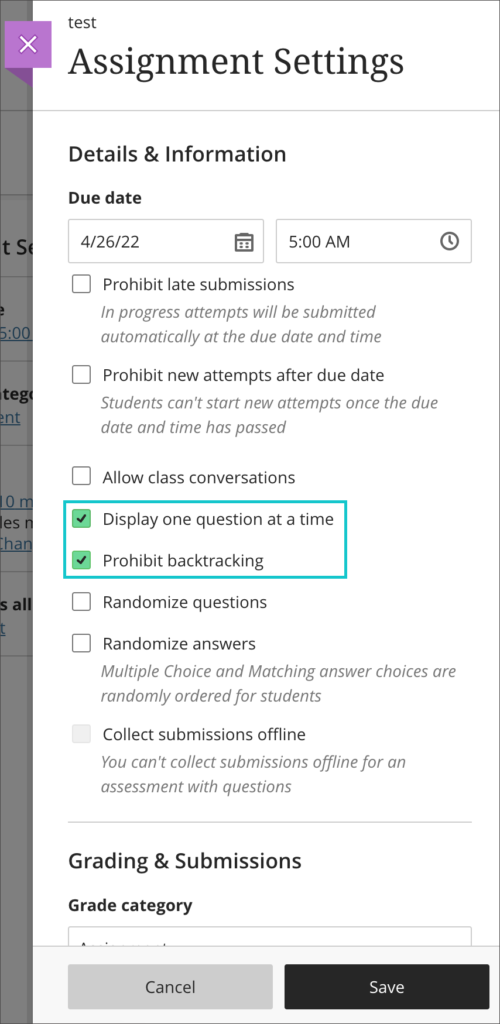
You can find out more about setting up and using tests in Ultra courses at: https://help.blackboard.com/Learn/Instructor/Ultra/Tests_Pools_Surveys/Create_Tests_and_Surveys
Improvements to inline rendering in Ultra courses
In the June upgrade, Blackboard added inline rendering for files uploaded into Ultra documents, meaning that instead of students having to download the attached files in order to view them, staff can set the attached file to display inline (i.e., directly in the browser) so that students can view the file without having to download it.
In the July upgrade, inline rendering will be extended to all supported file types regardless of where they are added into an Ultra course.
Inline rendering is supported for the following file types:
- Adobe Acrobat Documents (PDF)
- Microsoft Word (DOC, DOCX)
- Microsoft PowerPoint (PPT, PPTX)
- Microsoft Excel (XLS, XLSX)
- OpenOffice Documents (ODS, ODT, ODP)
- Image files (JPEG/JPG, GIF, PNG)
Please note that staff should continue to upload video and audio files into NILE courses via Kaltura. For information about how to use Kaltura to upload a video or audio file into NILE, please see: https://libguides.northampton.ac.uk/learntech/staff/nile-guides/kaltura
When uploading an attachment that can be displayed inline, staff will be given the following options:
- View and download
- View only
- Download only
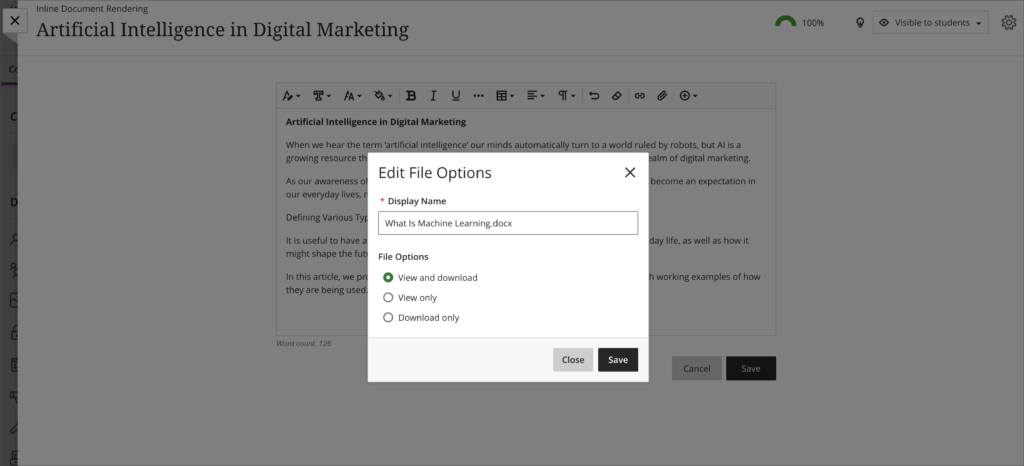
Files which have already been uploaded into Ultra courses do not need to be re-uploaded in order to take advantage of inline rendering – all files inside Ultra courses which can be rendered inline will be. Where files that can be rendered inline already exist in Ultra courses, they will be given a default setting of ‘View and download’.
Quality and accessibility improvements for mathematical formulas in both Original and Ultra courses.
The maths editor in Original and Ultra courses currently renders formulas in PNG format. Following the July upgrade, formulas will render as SVG images, meaning that the image will be remain sharp even if it is zoomed into.
Equations and formulas can be added into Original and Ultra courses wherever the Rich Text Editor is available.

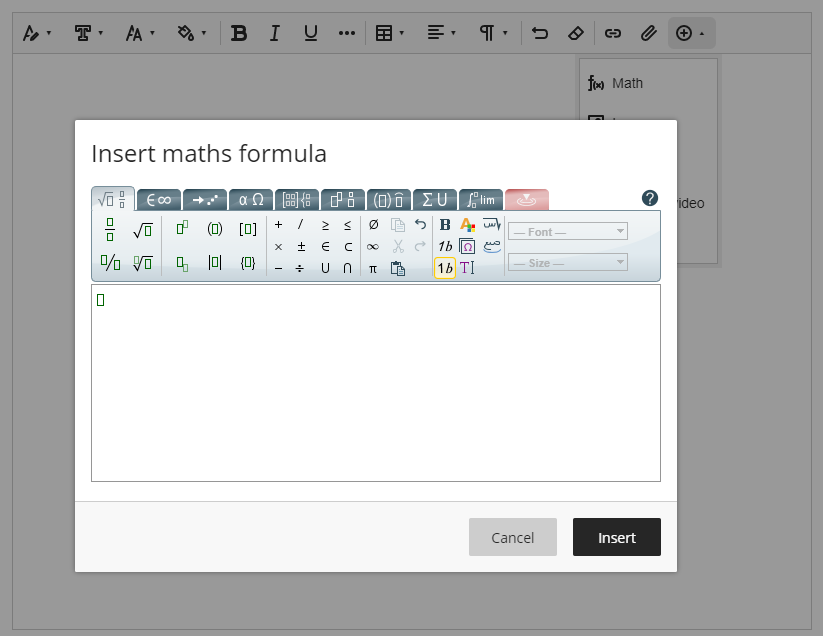
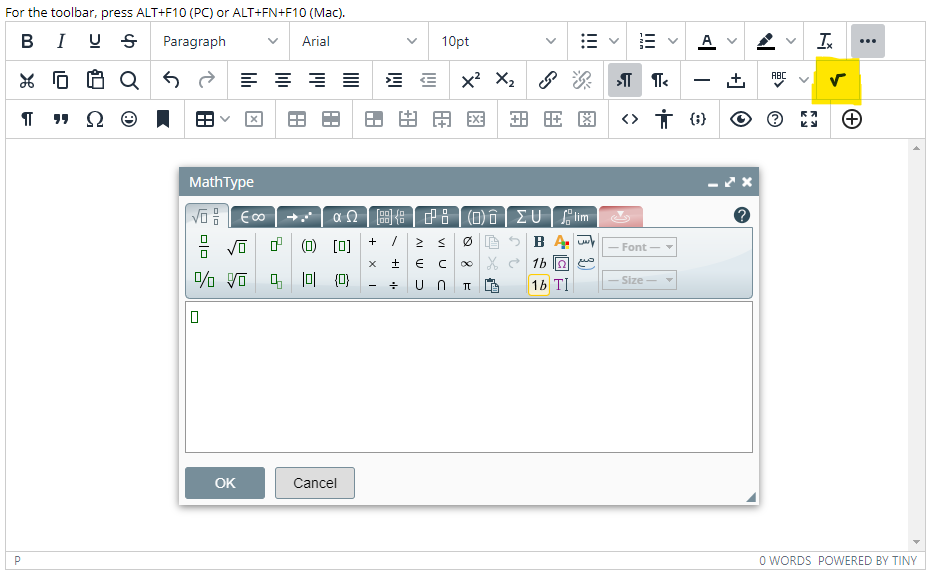
‘LTI item’ renamed ‘Content Market’
Following the July upgrade, ‘LTI item’ will be renamed ‘Content Market’ in the Rich Text Editor in Ultra couses.
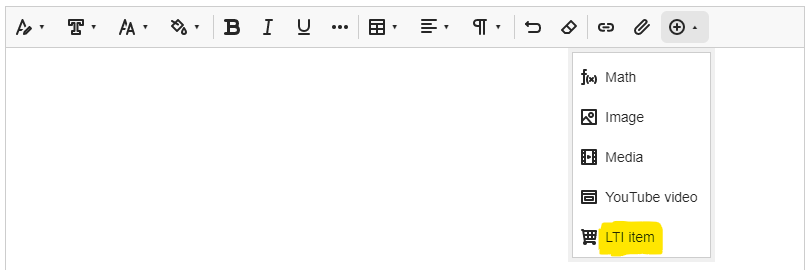
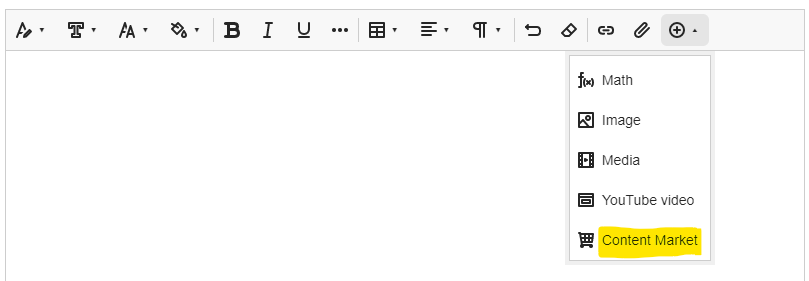
More information
As ever, please get in touch with your learning technologist if you would like any more information about the new features available in the June upgrade: https://libguides.northampton.ac.uk/learntech/staff/nile-help/who-is-my-learning-technologist
Blackboard’s June upgrade will be available from the morning of Friday 3rd June. The June upgrade includes the ability for staff to set PDF, Microsoft Office and OpenOffice files to render inline in Ultra documents. This means that students can view these documents directly in the browser without having to download them. Additionally, from 3rd June onward, staff can allow groups to have multiple submission attempts when using Blackboard assignments in Ultra courses.
Attachments render inline in Ultra documents
Image files in Ultra documents can already be set to display inline (i.e., directly in the browser), but from 3rd June onward, when uploading a PDF, Microsoft Office or OpenOffice file into an Ultra document, instead of students having to download the attached file in order to view it, staff can set the attachment to display inline so that students can view the file without having to download it.
Inline rendering is supported for the following file types:
- Adobe Acrobat Documents (PDF)
- Microsoft Word (DOC, DOCX)
- Microsoft PowerPoint (PPT, PPTX)
- Microsoft Excel (XLS, XLSX)
- OpenOffice Documents (ODS, ODT, ODP)
When uploading an attachment that can be displayed inline, staff will be given the following options:
- View and download
- View only
- Download only

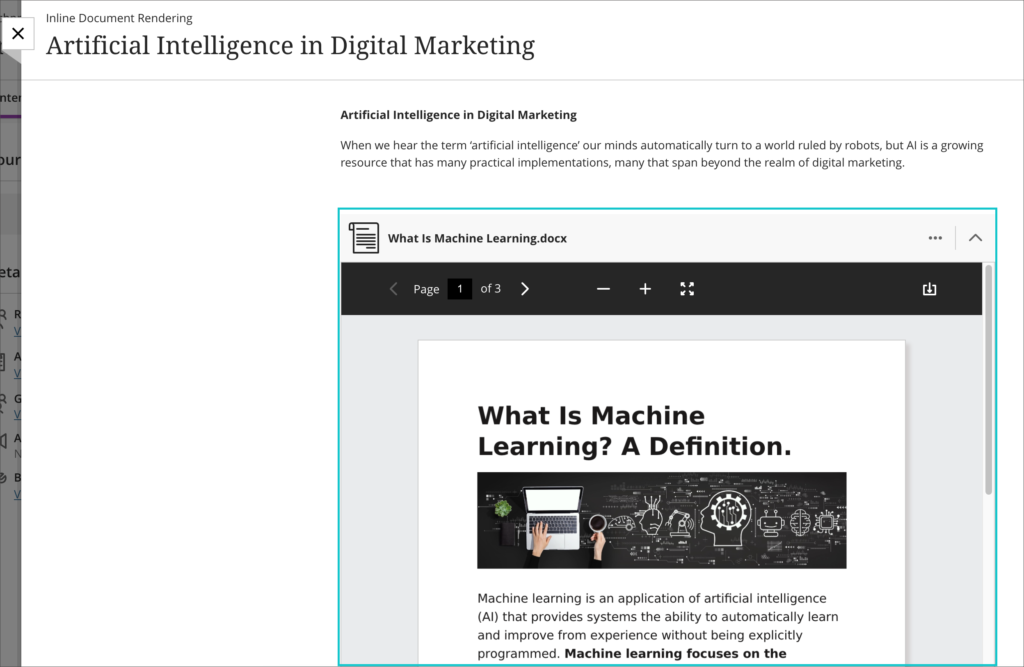
Files that are not compatible with inline rendering can still be uploaded, but students will need to download these in order to view them.
You can find out more about inline file rendering in Ultra documents here: https://youtu.be/e6o0xrePzyU
Multiple submissions are allowed for group submissions in Ultra courses
From 3rd June onward, staff will be able to allow groups to have multiple submission attempts when using a Blackboard assignment. Previously, group submissions were restricted to one submission attempt only, but following the June upgrade staff will be able to specify a maximum number of group submission attempts between 1 and 10, or unlimited.
You can find out more about setting up and deploying tests in Ultra courses here: https://help.blackboard.com/Learn/Instructor/Ultra/Tests_Pools_Surveys/Create_Tests_and_Surveys
More information
As ever, please get in touch with your learning technologist if you would like any more information about the new features available in the June upgrade: https://libguides.northampton.ac.uk/learntech/staff/nile-help/who-is-my-learning-technologist
Blackboard’s May upgrade will be available from the morning of Friday 6th May. The May upgrade includes improvements to Ultra tests for students, improvements to Ultra journals, the addition of an ‘undo’ and ‘redo’ function for Bb Annotate (the tool used to make notes and feedback on students’ assignments submitted via a Blackboard assignment submission point), and an Ultra course session time-out warning.
Improvements to UItra tests for students
The May upgrade includes improvements to Ultra tests for students, bringing in a test question filter, a test submission warning where students attempt to submit without answering all questions, and the ability to show and hide the timer on timed tests.
• Test question filter
The question filter supports common test taking strategies. For example, students may complete questions they know first and leave harder ones to complete later in the test. The filter enables students to quickly return to skipped questions. Students may also use the filter to find essay questions.
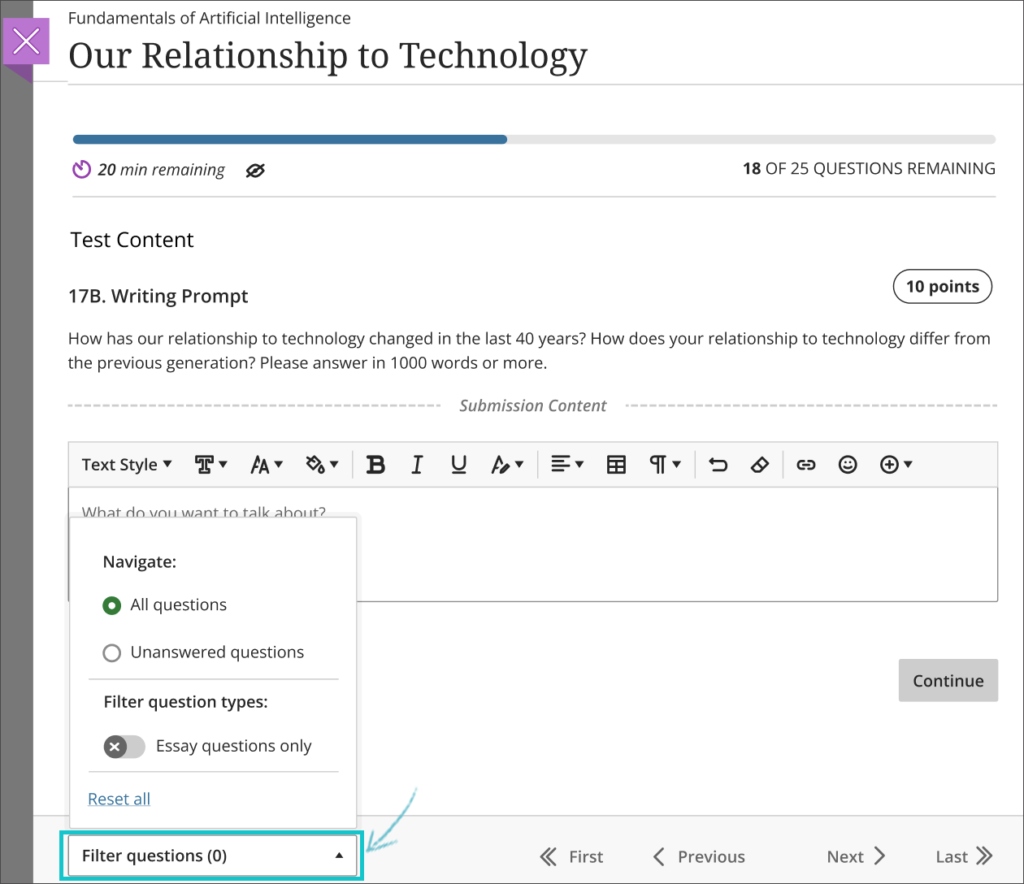
• Submit test warning
If a student submits a test with unanswered questions, a warning will alert the student. The alert shows the number of unanswered questions. The student may choose to submit the test or keep working. If the student chooses to keep working, the unanswered questions filter auto applies.
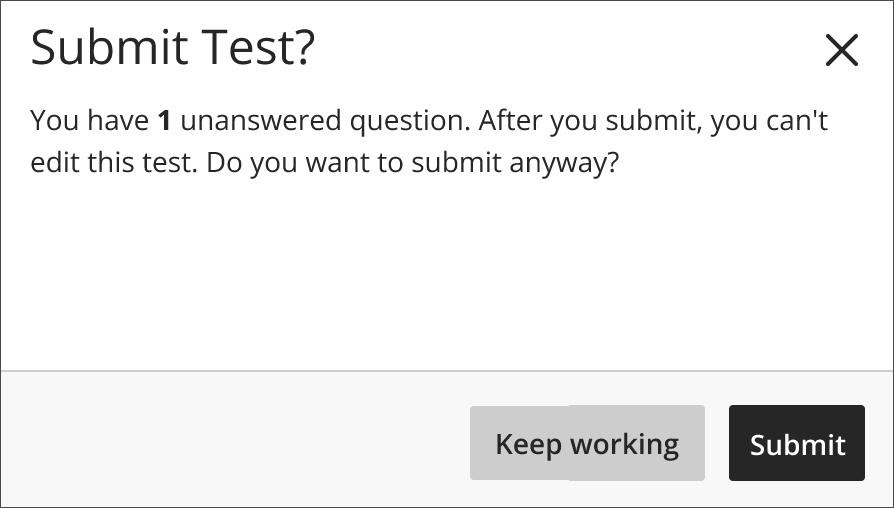
• Control timer visibility
In response to student feedback, students may now choose to hide the timer in timed tests. This may help to reduce pressure and anxiety during assessments. Once hidden, the timer may be easily made visible again.
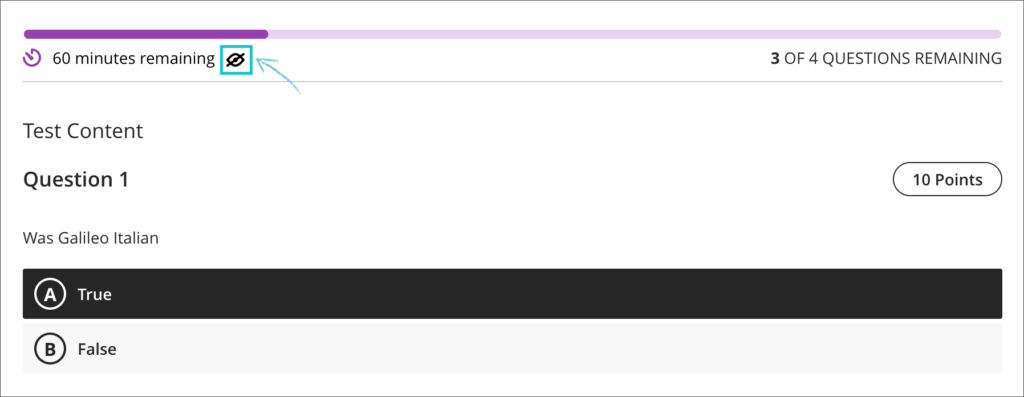
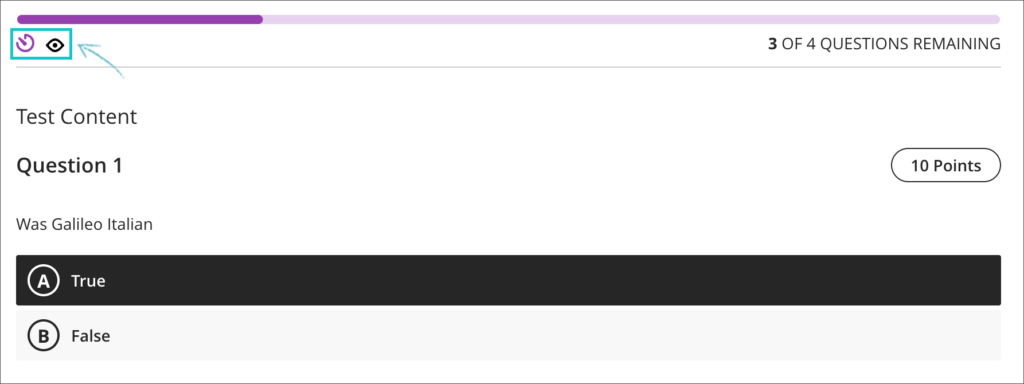
Improvements to Ultra journals
To better support staff and students who use Ultra journals, the May upgrade will include the following improvements:
- students may make unlimited journal entries;
- students and staff have improved navigation with pagination on the entries page;
- students and staff can decide the number of items that appear per page;
- staff have a count of graded journals and students filtered for grading.
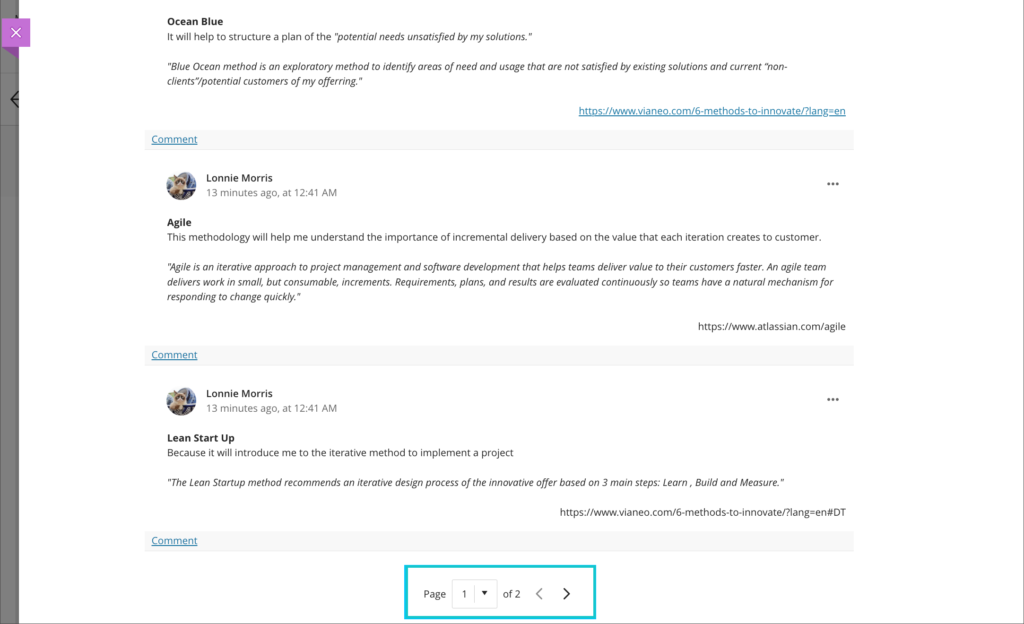
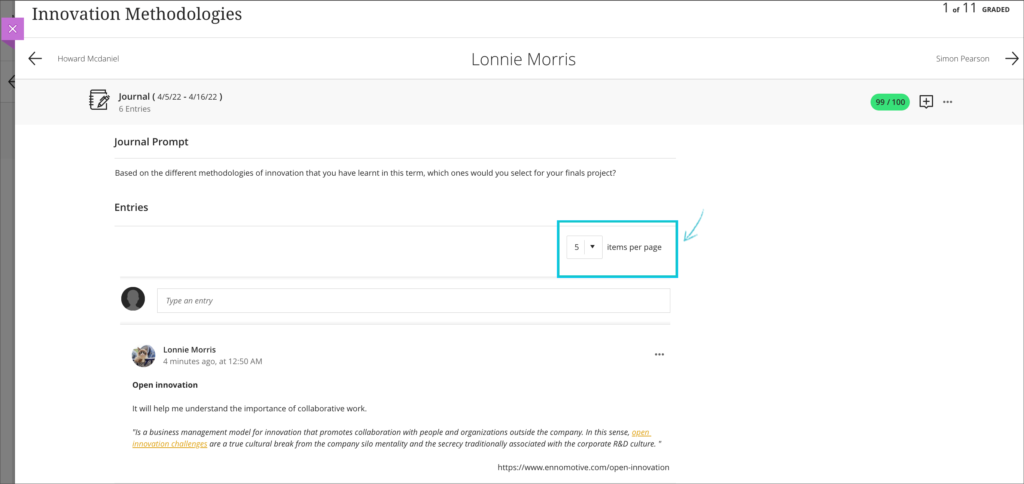
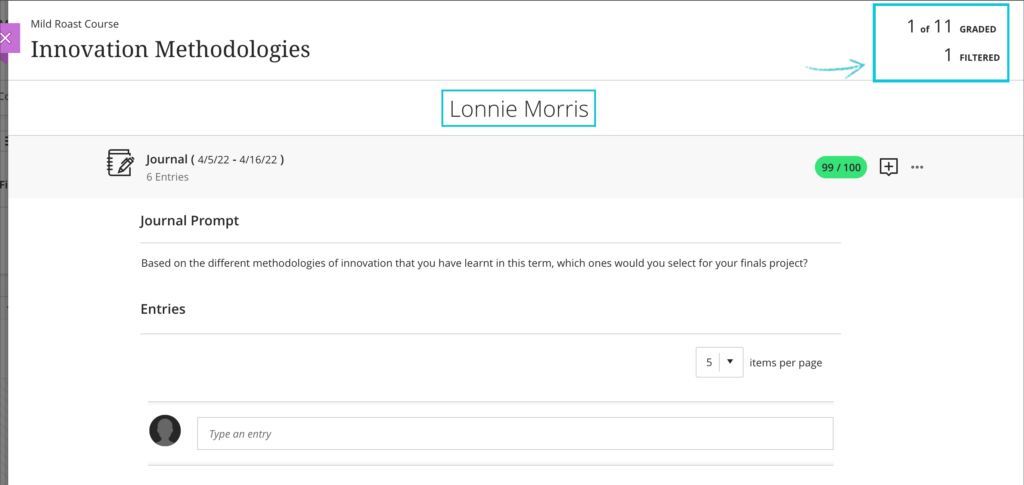
‘Undo’ and ‘redo’ capability in Bb Annotate in Original and Ultra courses
Following the May upgrade, staff using Blackboard assignments in both Original and Ultra courses will find that the Bb Annotate tool (the tool using for writing notes and feedback on students’ submissions) includes an ‘undo’ and ‘redo’ option.
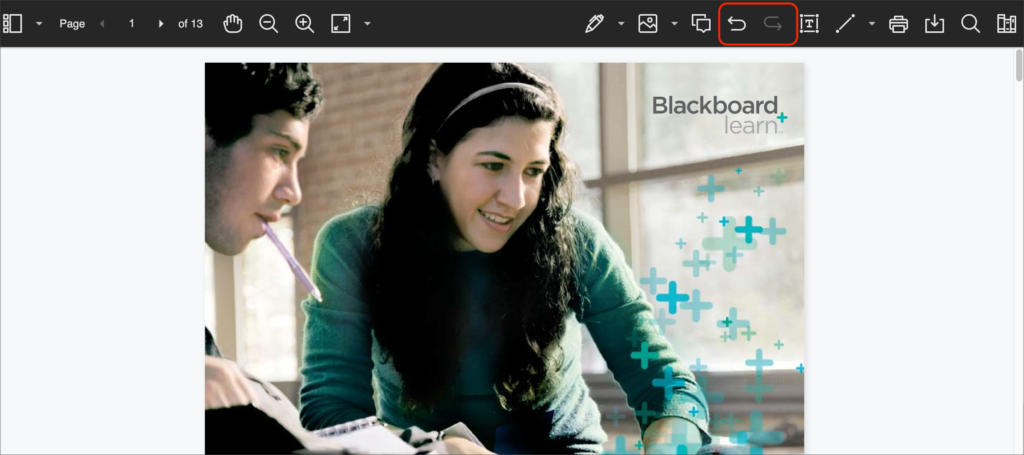
Ultra course session time-out warning
When a person does not do anything in NILE for over three hours their session ends (i.e., they are automatically logged out of NILE). They must then login again to continue to use NILE. Every time a user saves a page or selects a button their NILE session refreshes and stays active for three more hours. However, there can be times when a person is actually working but is considered by the system not to be doing anything. This happens because the browser is not sending data to NILE and can occur, for example, when a person is writing a long discussion board or journal post, or developing a complex rubric.
Following the May upgrade, staff and students who are working in an Ultra course and whose session is ending soon will receive a warning. This warning will appear at least six minutes before the session times out. If the warning is closed before the session ends, the session will be extended for three more hours, allowing staff and students plenty of time to complete their work and save it before their session ends again.
More information
As ever, please get in touch with your learning technologist if you would like any more information about the new features available in the May upgrade: https://libguides.northampton.ac.uk/learntech/staff/nile-help/who-is-my-learning-technologist.
Blackboard’s April upgrade (officially known as ‘Learn SaaS 3900.37.0 Feature Production Release’) was originally scheduled for 7th April 2022, but has been delayed and is currently tentatively scheduled for 21st April. Please note that the release date refers to the evening on which the release will be applied, so a 21st April date means that the upgrade will be available to users first thing on 22nd April. You can find out more about when the April upgrade will be available here: https://status.blackboard.com/incidents/0940tk6n2993.
The April upgrade includes:
- Significant improvements to Ultra tests.
- Improvements to the Ultra course copy tool, allowing copying of content within an Ultra course.
- Improvements to the Ultra content editor, allowing use of code snippets.
- The ability to verify students’ Blackboard assignment receipts in the Ultra gradebook.
The rest of this blog post explains each of these improvements in more detail,
Improvements to Ultra tests
The April upgrade includes many significant improvements to Ultra tests.
• Display test questions to students one at a time
Currently, Ultra tests display all the test questions to students in one long list. Following the April upgrade, staff will have the choice to display test questions to students all at once, or one at a time.
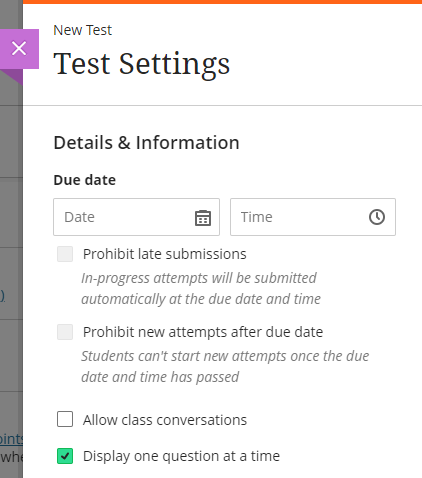
• Disable auto-posting of grades when using 100% computer marked tests
Currently, when using Ultra tests which contain only computer marked questions (e.g., a 100% multiple choice test) the overall test score is immediately displayed to students on completion of the test. After the April upgrade, staff will be able to choose whether or not the tests marks are posted automatically.
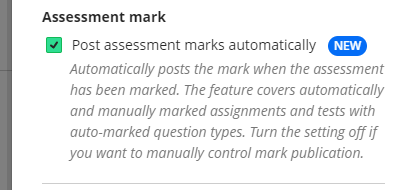
• Control over students’ ability to view their test submission, question feedback, question scores, and correct answers.
Currently, students can view their test submissions as soon as they have submitted them. The April release brings in the ability for staff to decide if and when a student can view their test submission. Staff can prevent students from ever being able to view their test submission, or can allow them to see their submission at a particular time, including immediately after submission, on the due date, on a particular date, or when all marks have been posted.
If a student is allowed to view their submission, staff can also choose when to display automated question feedback, individual question scores, and which answers in a computer-marked question were the correct answers.
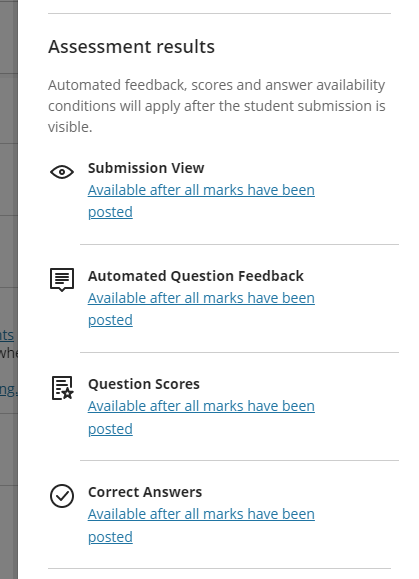
You can find out more about how to use these settings here: Blackboard video – student feedback display controls.
• New Ultra test question type: calculated numeric question
The April release includes the ability to add a calculated numeric question type.
This new question type supports the following:
- Students may enter a number as an answer. The number can be an integer, decimal, or scientific notation. The largest value supported is 16 digits.
- Instructors may combine text and mathematical formulas in the question.
- Instructors may define an answer range. The range value can be an integer, decimal, or scientific notation. The largest value supported is 16 digits.
- The answer field validates only numeric digits.
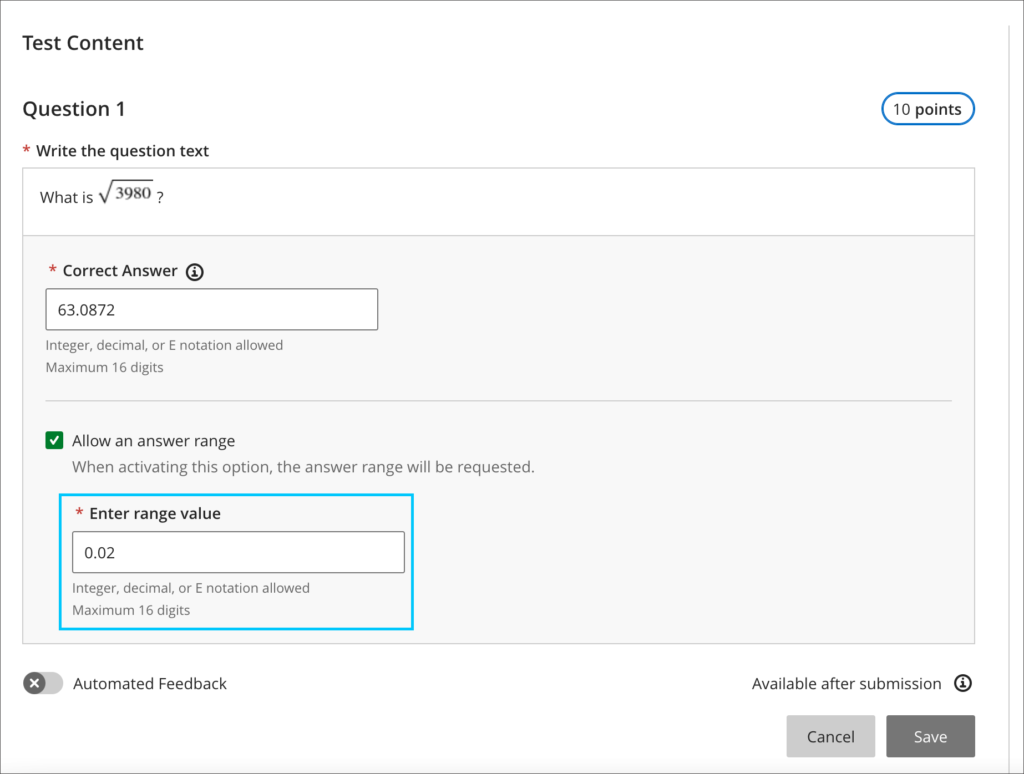
You can find out more about using calculated numeric questions here: Blackboard video – calculated numeric question type.
• Download Ultra test results
The April release includes the ability for staff to be able to download Ultra test results.
When downloading results, the following options are available:
- File type – Excel spreadsheet (.xls) or comma separated value (.csv); the default is .xls
- Format results by student or by question and student; the default is by student
- Download all attempts or only attempts included in the grade calculation. The instructor defines which attempts to include in the grade calculation in the ‘Grade attempts’ settings. The default is to download only attempts used for calculation.
You can find out more about downloading Ultra test results here: Blackboard video – download test results.
• More information about setting up and using Ultra tests
You can find out more about Ultra tests here:
Copy content within the same Ultra course
Currently, it is possible to copy content from one Ultra course to another, but staff are not able to copy content within the same Ultra course. The April release will include the ability to copy content within the same course.
You can find out more about the enhancements to the Ultra course copy process here: Blackboard video – copy content enhancements.
Content editor update – code snippets
The April upgrade will allow staff and students to author and share computer code in the content editor using a new code snippet tool.
The content editor identifies eleven programming syntaxes:
- Python;
- Java;
- JavaScript;
- Kotlin;
- R;
- PHP;
- Go;
- C;
- Swift;
- C#;
- HTML.
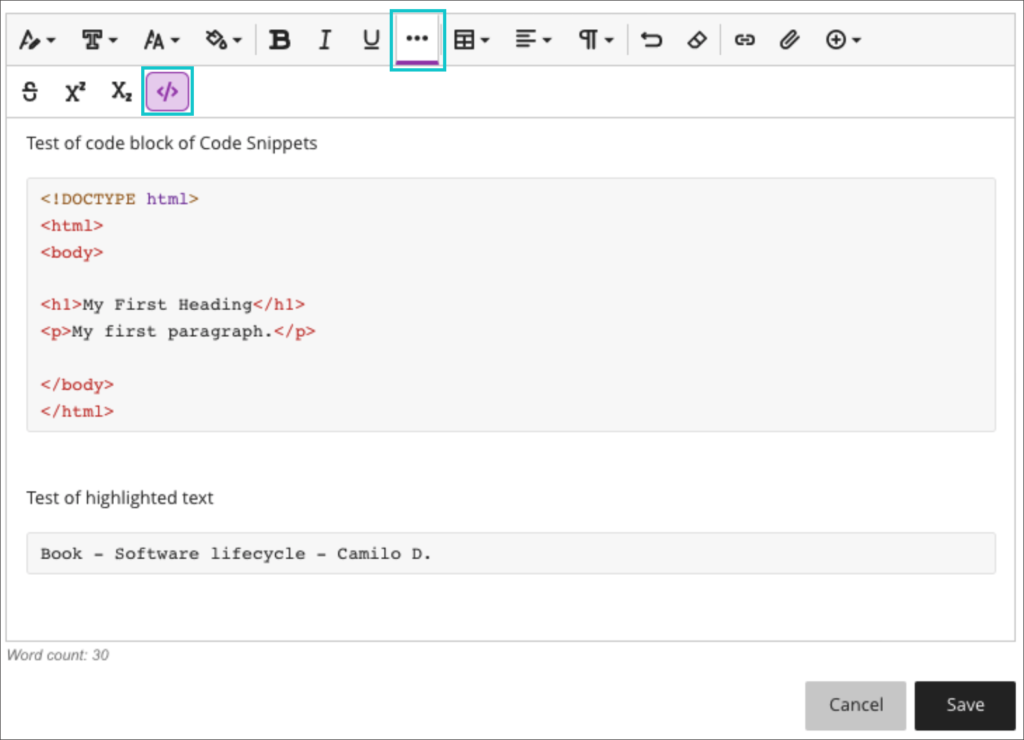
You can find out more about code snippets here: Blackboard video – code snippets
Submission receipts for Blackboard assignments
Currently, while Blackboard assignments generate and send students a receipt for a submission, the receipts are easily edited and cannot be verified. Following the April upgrade, staff will be able to verify students’ submission receipts in the Ultra gradebook.

You can find out more about these enhancements here: Blackboard video – submission receipt enhancements.
More information
As ever, please get in touch with your learning technologist if you would like any more information about the new features available in the April upgrade: https://libguides.northampton.ac.uk/learntech/staff/nile-help/who-is-my-learning-technologist.
The March upgrade, which will be available from Friday 4th March, includes some minor changes to way that learning modules in Ultra courses are set up and modified.
Learning Modules
When setting up learning modules after Friday 4th of March, the following panel will open up once a learning module has been selected for creation:
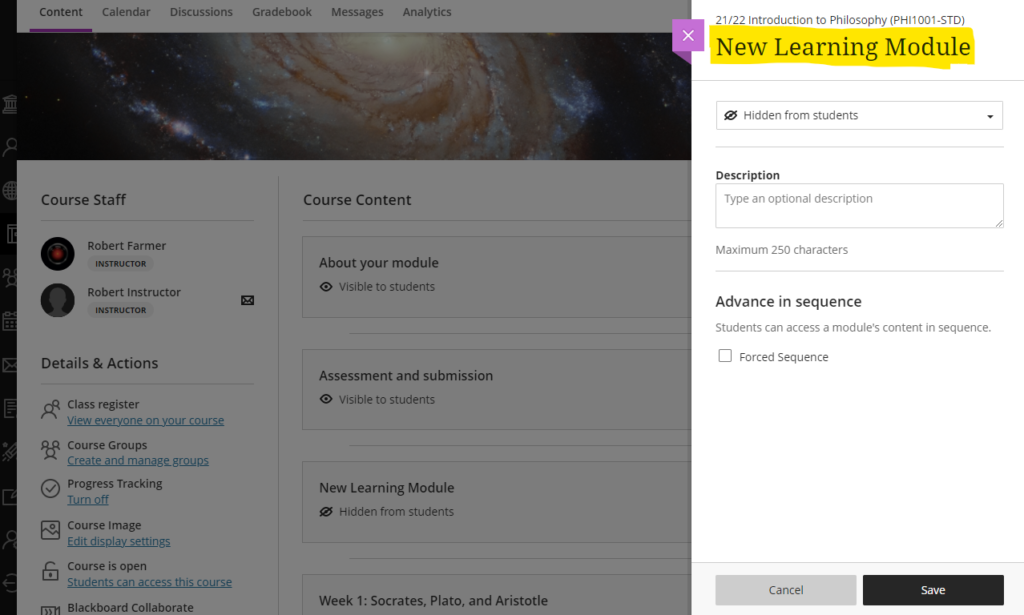
From this panel, the learning module can be named and a description can be added. The learning module availability can also be set (‘Visible to students’ or ‘Hidden from students’), or release conditions can be set allowing the learning module to be made available to all or only certain groups of students. Release conditions can also include the learning module being made visible after and/or until a particular date.
Additionally, learning modules can be set so that students have to navigate through the content in order and cannot skip ahead. To enable this, ‘Forced sequence’ should be chosen when setting up the learning module.
To update any of the learning module settings after it has been created, simply select the ellipsis menu on the right-hand side of the learning module and choose ‘Edit’.
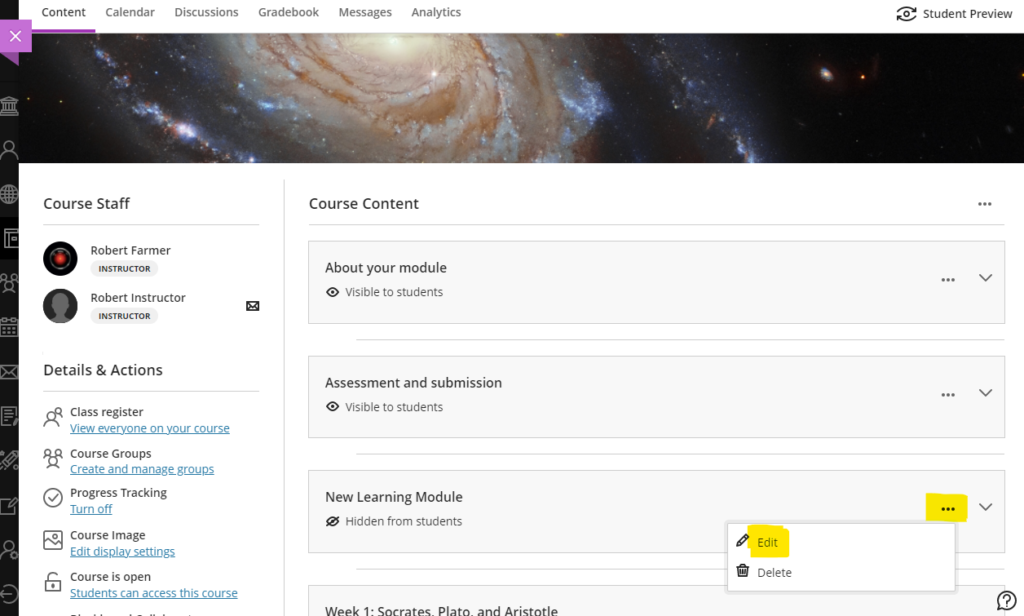
Also, learning module descriptions are now visible immediately, and students no longer have to open the learning module to read the description:
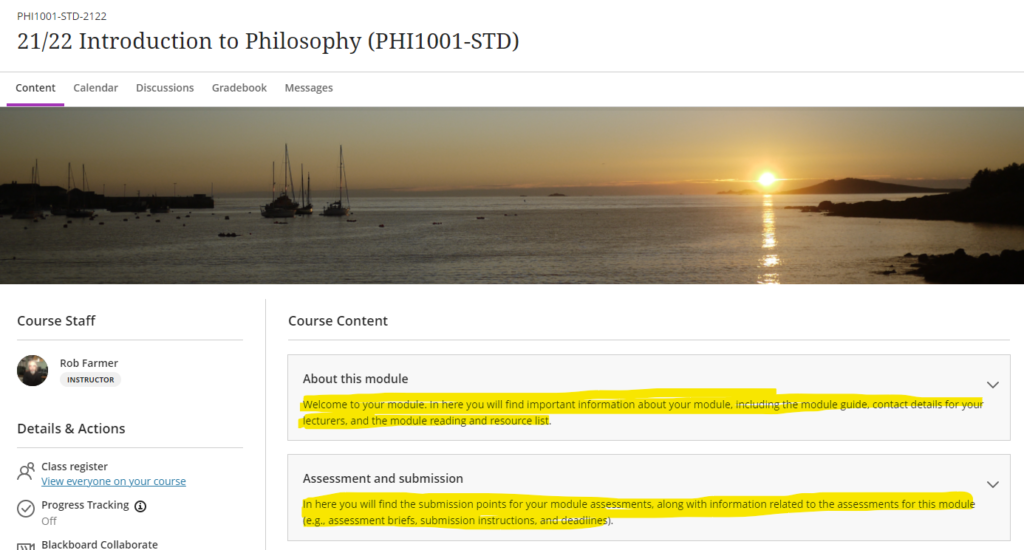
You can find out more about how to use learning modules in Ultra courses at: https://help.blackboard.com/Learn/Instructor/Ultra/Course_Content/Create_Content/Create_Containers_for_Content/Create_Learning_Modules
More information
As ever, please get in touch with your learning technologist if you would like any more information about the February upgrade: https://libguides.northampton.ac.uk/learntech/staff/nile-help/who-is-my-learning-technologist
Recent Posts
- Blackboard Upgrade – January 2026
- Spotlight on Excellence: Bringing AI Conversations into Management Learning
- Blackboard Upgrade – December 2025
- Preparing for your Physiotherapy Apprenticeship Programme (PREP-PAP) by Fiona Barrett and Anna Smith
- Blackboard Upgrade – November 2025
- Fix Your Content Day 2025
- Blackboard Upgrade – October 2025
- Blackboard Upgrade – September 2025
- The potential student benefits of staying engaged with learning and teaching material
- LearnTech Symposium 2025
Tags
ABL Practitioner Stories Academic Skills Accessibility Active Blended Learning (ABL) ADE AI Artificial Intelligence Assessment Design Assessment Tools Blackboard Blackboard Learn Blackboard Upgrade Blended Learning Blogs CAIeRO Collaborate Collaboration Distance Learning Feedback FHES Flipped Learning iNorthampton iPad Kaltura Learner Experience MALT Mobile Newsletter NILE NILE Ultra Outside the box Panopto Presentations Quality Reflection SHED Submitting and Grading Electronically (SaGE) Turnitin Ultra Ultra Upgrade Update Updates Video Waterside XerteArchives
Site Admin

